











Dear Teen Ink Readers,
Welcome back to another issue of Teen Ink magazine! This time, we're focusing on creative writing and celebrating Pride Month.
In this edition, you'll find fascinating fictional stories that are sure to entertain. Our fiction section dives into the creative minds of our users — introducing you to new worlds and interesting perspectives. You'll even get to encounter a conversation between Life and Death! We've also included some incredible articles focusing on Pride. These pieces cover topics such as discovering identities and learning to accept yourself. We hope you find these experiences just as inspiring as we do.
We've also announced the winners of our Educator of the Year contest in this issue! This contest is something we look forward to every year, and we love seeing all the amazing educators who are nominated. Teen Ink would like to congratulate and thank every educator for being such phenomenal inspirations and sources of encouragement for their students.
Every day, our editors are blown away by the way you all express yourselves — whether it's through art, photography, poetry, storytelling, or by sharing your personal experiences. It means a lot to us that you feel comfortable enough to share your life and talent with us, and we want to showcase your work as much as possible! We always welcome your feedback. If you want to write a letter to an editor or respond to an opinion article, visit teenink.com/submit!
Best regards,
The Teen Ink Team

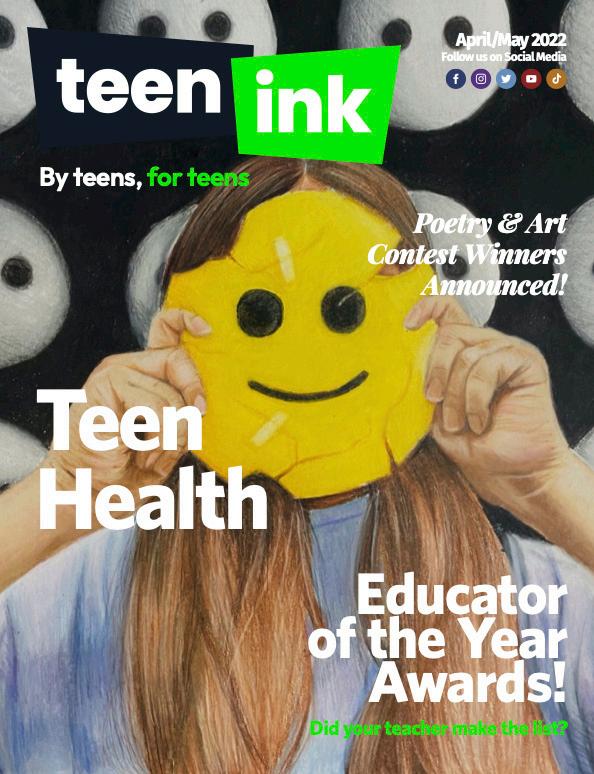


There was not a big revelation or event that made me realize I was not straight. It was something that I chose to never think about. The very idea of such a thing felt cursed to even enter my mind when I was younger. It was like a monster that needed to be hidden. It would hide under your bed until you finally faced it. Living in my shadow, waiting to pounce, the creature latched on to my soul and would randomly pop out to scare me. I was such a naive child with anxious thoughts overfilling my head and spilling everywhere. Innocent, childish comments would sour into hidden feelings and trapped desires.
A memory trapped inside my head from when I was younger revolves around a conversation with my mother. This flashback is the one memory I think of when people ask me “When did you
...[THAT "MONSTER"] WAS NOT SCARY, NOR SOMETHING TO BE AFRAID OF
know?” I had been getting ready for school putting my navy uniform stockings on one at a time and I wondered aloud, “I understand why people like boys and girls. You are attracted to someone’s personality, not what they look like. So, how could you even know what gender they were?” My little brain had all the puzzle pieces but could not quite fit them together. Then there was silence. No response from my mother. A feeling of fear filled me. I could not think about such things or it would happen to me I thought. An excuse fell
PHOTO BY AN NI JIANG, YANGZHOU, CHINAfrom my lips perfectly, “But I like boys. I do not understand it but I do.” I would
SLOWLY, I ACCEPTED IT AND DID NOT BANISH IT FROM EXISTENCE
continue to have that conversation with myself as I grew up. It became that I refused to put the puzzle together, it was not allowed.
I do not know when the whole lesson of “a man should be with a woman, not another man” was ingrained in my head, but even from a young age I knew that “fact” by heart. It could be from the countless religion classes that made me learn about Catholic matrimony between a man and a woman only. It could be from the harsh comments my father would make at gay couples on the TV. It could be from the fact that I never even learned what the LGBTQ+ was because my parents never wanted to “expose” me to it. A rainbow flag could very much as well be a foreign country to my younger self. Unlearning such a lesson that was drilled into me as a child took time and acceptance. I had to learn that there were no rules to life that I had to follow. I had to look at that “monster” that was following me and realize it was not scary, nor something to be afraid of. It was a part of me that I did not allow in. Slowly, I accepted it and did not banish it from existence. I left the doors of myself unlocked and the windows open.
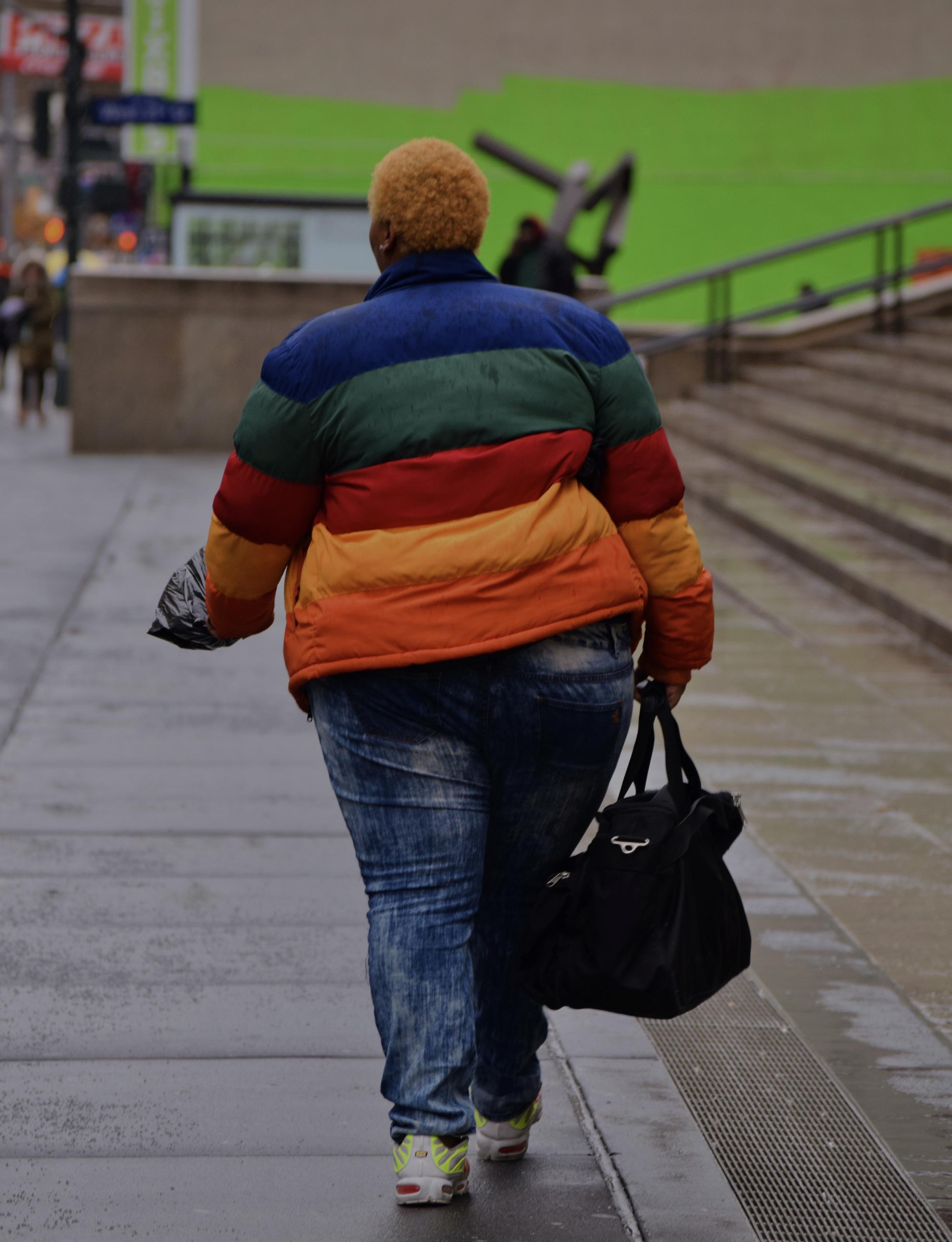
“Lesbian”
My classmates erupted with laughter after hearing the grade’s cool girl say this word. Piqued by curiosity, I drew closer to the group. Whatever the meaning of this word was, it must be pretty funny.
“Lesbian”
My classmates erupted into laughter again, even harder this time.
“Lesbian”
My classmates fell into hysterics. I laughed along, too, influenced by crowd psychology despite lacking a concrete reason to laugh. After the exchange, I asked the cool girl what that funny word meant. “You mean lesbian? It's when two girls like each other like a boy and a girl do.” The final piece of an unfinished puzzle fell into place, and I soon realized that I was gay.
My awakening wasn’t very momentous; it was simply something I came to know after recognizing that being gay was a possibility. That summer, the summer after 4th grade, I decided to come out to a close friend of mine at a sleepover. "Oh...That’s cool," she replied, her reservations unbeknownst to me. After chatting for a few more minutes, we decided to go to sleep and say goodnight. A few hours later, I woke up and realized that she was no longer asleep next to me. I sat up from the bed and glanced around the room for a little bit before falling back asleep, assuming she had gone to the bathroom. It wasn’t until four years later that she told me that she "felt weird sleeping in the same bed as a gay person" and had slept on the floor instead.
Though I accepted my queerness without hesitation, when I returned to my small Catholic school, it became clear to me that the people around me did not hold the same perspective. One instance that stood out to me was when I came out to some of my other friends at
a group hangout. Taking a second to register what I just said, their facial expressions morphed into looks of distaste, and they backed several steps away from me. "You don’t have a crush on us, right?" one of them asked, not masking her disgust. I suddenly felt selfconscious, and my insides formed a million little knots. I swiftly took back my words, explaining to them that I was probably just confused. "Thank God. You really had me worried," one friend muttered. Another noteworthy occasion occurred while talking about my sexuality with one of my friends at the lockers. "What did you just say?" a voice from behind me interjected. I turned around to see a group of three boys standing directly behind me. Unsure of how to respond, I told them that I was gay, and their faces contorted to the same mixture of disgust and apprehension that I had seen earlier with my friend group. "Ummm okay… How are you gay if you’re only in 5th grade?" one asked. "That’s kind of gross," another remarked. The third replied, "I’m not really into that." I stood there with a lost expression on my face, again unsure of how I should answer. I opened my mouth to say something but was cut off by the teacher calling everyone back into the classroom. For the rest of the school day, all I thought about was how I should have kept my orientation a secret.
Though I didn’t think much of these experiences at the time, they were my first lessons on how the world saw my sexuality. It wasn’t so much a feeling of rejection as I hadn’t yet taken on queerness as a part of my identity. Rather, it was similar to telling a joke that nobody laughed at and taking a mental note not to tell jokes like that again. I began to act as if the whole "gay phase" had been a joke, and my new label as the class "lesbo" was forgotten by most.
Being closeted opened my eyes to the possibility that my sexuality may never be accepted. I began to fear that queerness designated me
to a life of secret-keeping and that I would never be able to come out without disapproval. I felt that it isolated me from other people, and I almost felt guilty that it was a part of me. I decided it would be better if my queerness did not exist at all. By the end of 5th grade, I had shifted from merely concealing my gayness to denying that it existed. I took countless online "Am I Gay?" quizzes and retook them when I didn’t get the answers I wanted. I stayed silent at homophobic comments because only a gay person would be offended. When watching TV shows, I picked out the most conventionally attractive man and convinced myself that I found him attractive. I eventually took this further by "choosing" boys in my class to have crushes on, even though I felt largely indifferent towards them.
As I progressed into middle school, my school’s homophobic culture further reinforced that queerness was unwelcome. Phrases such as "that’s so gay" and "ew, she’s so lesbian" were synonymous with "weirdness" and further solidified that queerness was not meant to be shared with the world. Some of my classmates, including those I was close with, even championed the saying, "It was Adam and Eve, not Adam and Steve."
I came to learn that the majority of my tight-knit extended family also held homophonic sentiments, as they believed queerness was weird, something to make fun of, and intrinsically disordered. The "funny uncle'' made one too many jokes about the "girls who liked to kiss each other." The cousins gossiped about the weird gay kids in their classes, who they were afraid might have crushes on them (solely on the basis that they were gay). The older members of the family even explicitly told my siblings (one of whom is, ironically, also queer) and I that if any of us were gay, they would not attend the wedding.
The times I came close to accepting my identity, I was met with the anti-gay rhetoric of the faith I had
grown up with — the gays would burn in Hell. Numerous articles and preachers proclaimed that there was no way for “the homosexuals” to be saved from hellfire and deemed them as Sodomites, sexual perverts, pedophiles, and an abomination to the Lord. Others preached the milder but ultimately still harmful rhetoric "Love the Sinner, Hate the Sin™." Though I found some articles about a loving God who accepted people of all identities, slews of comments denounced their authors and all those who believed in their rhetoric as "false prophets." Many even sent warnings of the wrath of God that would await them in hell. To prepare myself for a fate of fire and brimstone, I spent hours searching the internet for everything humans knew about hell and stumbled upon sketchy websites with information like a woman who claimed that she saw Micheal Jackson in Hell and YouTube videos with "REAL AUDIO TAKEN FROM HELL.” I begged God to treat me with His compassion — the compassion that some conservative Christians seemed to forget about when addressing the issue of gay rights.
One of the most defining aspects of my experience in the closet was the pervasive fear of being "caught." One occasion that was particularly jarring occurred at the 8th-grade lunch tables during a conversation about which classmates were most likely to be gay. "Moira is definitely
lesbian. She’s so weird!" one of the girls exclaimed. "Drew is probably gay, too. He’s in Choir!" another girl added. A friend of mine (the one who I had come out to at the sleepover in the summer before 5th grade) decided to join the conversation and chimed in with, "Alina told me she was gay." Stunned at what I had heard, my throat closed, and I felt my nails create tiny crescent-shaped indents on my palms. I tried to suppress the heat that was beginning to rise to my face and did my best to keep a composed expression on my face. The surrounding chatter faded, and the girls began to look at me, awaiting a response. I reassured them that what I had told my friend had been a joke, albeit one I had made the summer before 5th grade. Watching the expressions of my friends carefully, I noticed that they looked at me with uncertainty. I suppressed the rising lump in my throat and continued to do my best to emulate the look of an innocent person. My eyes locked with my best friend, and in an instant, she interjected, "Oh yeah! She DID say that in 5th grade.” My case was put to rest. All of the muscles in my body relaxed at once, and I gave my friend a look of gratitude.
Later that year, I finally decided to come out to my best friend. Over the years, we had told each other almost everything (except that I was gay, of course): both trivial details and "big secrets." I felt as if a mutual acceptance of the authentic parts of
ourselves existed within our friendship. Though I still wasn’t certain of her stance on gay people, I was optimistic that she would understand. To add, at that point in time, I was able to confront my queerness to a greater extent than I had been able to previously. Living a lie grew more suffocating day by day; I wanted nothing more than to kick the closet door into a million little wooden shreds. I was gay, and nothing I could do would change that.
"That’s cool," she responded.
I was appalled. Why was she so nonchalant? Didn’t this make me weird, perverse, and someone who should be an outcast? For the first time, I felt as if at least one person wouldn’t distance themself if they knew who I really was. For the first time, I felt as if my sexuality could be treated as normal. For the first time, I felt as if queerness did not diminish my worth as a person.
Shortly after my first successful coming-out, the COVID-19 outbreak cut my 8th grade (and thus middle school) career short, and I was finally released from the environment that kept the pillars of my internalized homophobia intact. A few months of at-home learning helped me to uncover that the majority of the "confusion" I spent years grappling with was actually the anti-gay sentiment of the people surrounding me. In fact, it
wasn’t until I wrote this piece that I fully realized how much it had clouded my perspective. I finally embraced queerness in my identity because I wanted to protect and nurture the aspect of myself that had been damaged. I soon became comfortable enough to come out to more of my close friends and family members, and though some did not accept me, I now felt as if I was more equipped to deal with homophobia.
By far, the most important person I came out to was my mom. She had never indicated holding homophobic beliefs and is a kind and accepting person. I found it difficult to believe she would ever say anything to hurt me. However, there was still the very real fear that she would be disappointed that I was not the child she wanted. I decided I wanted to tell her when we were on our way to pick up tacos for dinner. The whole way there, I stayed silent, ruminating over the ways I would tell her and the ways she could react. I paced as I waited for the tacos, and my legs shook as I walked back to the car. For a while, we resumed driving in silence, my throat clenched shut from nervousness. Finally, I said, "I’m gay. Is that okay?" She paused for a second and said, "Of course, honey. You know I’ll love you no matter what."
i don't go by the Name with which you named Me, that sunlit day, three days after my birth Teary-eyed, nursing that perfect little baby girl four-pounds eight-ounces the littlest little baby Girl born in the hospital that day.
she cooed; what sounded to you like the notes of a Melody you heard somewhere/somehow you felt it — the spark that spoke to you singing the harmonies to the lullaby that your own mother had passed on to you and it felt Right.
//
with time she grew to fit the role the role of a perfect little baby Girl adorned with that delicate and fragile smile and most importantly that heartwarming voice
she sang for whoever came her way and they'd always praise her she had found Solace through the Melody.
// but in reality, her Melodies were always out of tune always a minor/major out of place always missing the half-stop at the end always forgetting the lines to the chorus always a little too short for the crowd always squinting in the back of the classroom always shoved to the corner her magic spell wore off, yet she couldn't pinpoint the pain.
at times she was a little too Rambunctious so they smirked and called her god-forbidden phrases stripped of her own femininity resorting to food but even that stopped coming her way when her mother found out that she was gay
and so she stopped speaking perhaps for a while or two
// and though she was overexposed at a young age she threw herself into new Medias new social medias that fed into her naïve curiosity gnawing away at her youthful innocence turning the clock with its blood-stained fingers
and oh, she broke the rules that ma and pa had set for her to follow the rules that she was supposed to follow since birth since the day she exited her mother ma made the rules she broke them.
// with time, it all made sense why she hated the way the skirt fitted her waist, the uncomfort like a million pair of rotting hands belonging to men smudging ash onto her body
it all made sense when she looked in the mirror cutting pieces away like she deserved it
she saw the girl across the mirror with her girl clothes, girl hair, girl voice girl/girl/woman/boy. boy.
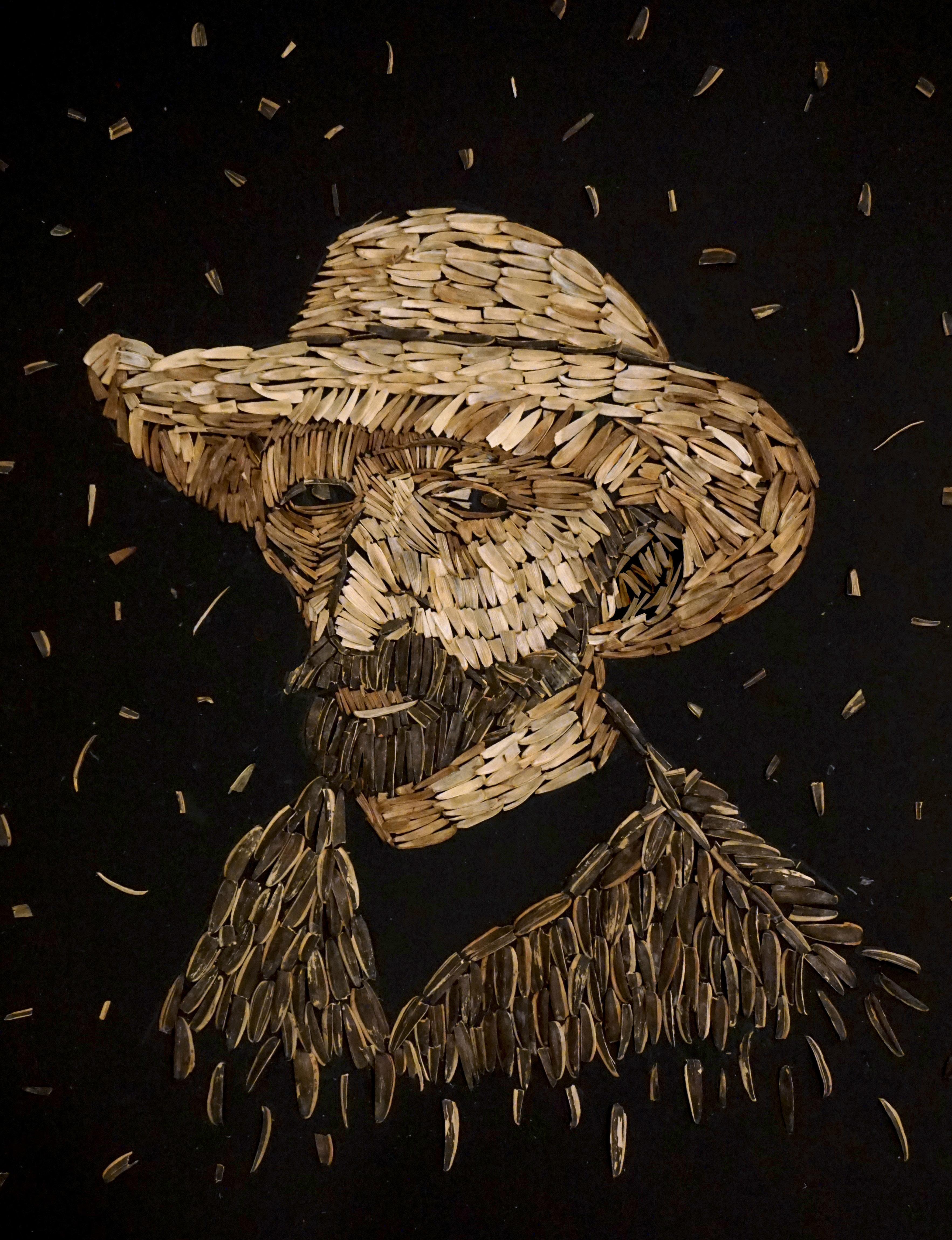
“Many people seem to think it foolish, even superstitious, to believe that the world could still change for the better. And it is true that in winter it is sometimes so bitingly cold that one is tempted to say, ‘What do I care if there is a summer; its warmth is no help to me now.’ Yes, evil often seems to surpass good. But then, in spite of us, and without our permission, there comes at last an end to the bitter frosts. One morning the wind turns, and there is a thaw. And so I must still have hope.”
– Vincent van Gogh, 1888 ***
The walls of the Saint-Paul-de-Mausole asylum are void of color. They are sick and lumpy — mere blank reflectors of their inhabitants’ misery.
This morning, the fragrant, sunlit France of my fancies is nowhere. Instead, a haze seems to obscure all Saint-Rémy-de-Provence, where the illusory comfort of my squalid, itchy sheets shatters; my dreams escape to the night held hostage by my nightmares; and I awake to be greeted by a grey day and those pale walls.
The paper is unevenly textured with swelling bulges spread throughout, as though slugs are crawling underneath the plaster and causing the ever-present stench in the room of madness and tears. It is the worst sort of monotony, tedious and nauseating. I feel an arcane desire within me to escape this. It propels me, before thought, to sit up and throw away my covers to vacate the place I languished all night, upon which sorry attempt, I find the thicket of tragedy only denser all around me. For my view of the dreaded wall sharpens, and my eye catches a break in the pattern — right at the edge. The wallpaper has peeled to reveal a yellow underneath. Not the golden of sunrays or flowers but the putrid, unripe lemon of decay and illness. These walls are falling apart; the very world is deteriorating.
My drab clothes wait for me to dress, but all the wonder and feeling I have labored so hard to convey my whole life are gone — everything. What was colorful and bright, those white walls have consumed, leaving me with their mocking, smug uniformity.
My eyes and ears seem to bleed from the way I have strained them to observe every detail of the world’s beauty. Now, their object having perished with the suddenness of the time, they are bereft and reeling. The hours my hands have spent in devotion — nay worship — of the picturesque, the divine, are countless as the stardust in the sky. They seem to stretch out before me now as an empty and wasted infinity.
Distantly, I hear the forever interrupted by a knock on old wood, then the squeak of rusty hinges being strained.
I pull the shirt over my head, so I am in darkness as a man of the order enters and places my breakfast upon the shabby stand near the entrance. Fully dressed, I approach the stand — the sludgy food that is plated on the tray, and beside it, a chipped cup of water — and all I see are the little, white cylinders that are powdery at their edges and have left their chalky dust on the tray under them where they lay.
The monk has places to be. Perhaps he asks me to drink, to swallow the pills. But I am already gone — the pain that was born from the moment I awoke crescendos now, and I can see nothing beyond it.
It is unbearable — or, at least, I cannot bear it.
My head is tormented with sharp, pounding aches; my senses, in a deep stupor, are depressed. At times, it is like a dull butter knife is being forcefully dragged through my mind in a migraine that ails me for hours.
...I AM BEFORE THE WONDER AND ARTISTRY THAT SINGS OF ABUNDANCE
At others, it seizes the whole of me, like a sword, sharpened to be paper-fine, cutting my soul in a singular moment of agony.
And, always, there is the fog that remains over my senses, another way of pain. It makes the merest exertion exhausting and gives everything the appearance of black grief — like no happiness will be known to man again.
I feel it is for forever.
There is a window, whence — when the Sun finds my part France, cloaked in despair and madness, and deigns to shine upon it — the misery of the room is slightly lightened.
But my gloom — a mad, dolorous thing that wreaks havoc with its wilful and wicked ways — has veiled the splendor of this light with slashes of blackness across the blue aperture. They have the banal way of evil about them — as the walls, the furniture, the fabrics do; as does everything in this den of insanity. They rip apart any last respite I have from the agony, any lost
vision of the beauty I still possess.
They are tears — pin-straight, metallic, the black of wells and holes and voids. Just like bars.
The day, the next, and perhaps many others, pass away — like a forlorn life — to bring me here. To this night, before this window.
I am exhausted from waking for long hours, and the pain — my pain that is for forever — accompanies me here as anywhere else.
But I can see it.
In this moment, the misery is just dust behind the lush curtain of outer space whispering sad dictums, unheard, and I am before the wonder and artistry that sings of abundance and livens the world.
The pinpricks of silver in the sky overtake its darkness with their multitude like someone crushed those foul tablets wholly and sprinkled the powder across the onyx blanket to bring it alive. Where they touch the heavens, the space brightens and turns blue to become a place of dreams and whimsy.
I feel the deep soreness of my eyes — from constantly begging cruel, crumbling time to return to them the sight of beauty — slowly healing as the salve of longheld tears washes over them. I want to reach out, clutch this silk blanket of the heavens so that it pools between my fingers, and drape it over these pained eyes.
It appears the bars, the previous barricades to my vision, are gone — that I am beyond them.
And in this place, beyond the sadness, my fatigue overtakes me — gently, from my window to my bed,
THE WORLD I LEFT BEHIND I CAN SENSE HERE, IN THE WARMTH OF THE SUNRISE AND THE AROMA OF RICH OIL FROM MY PAINTS. I MUST BRING IT TO LIFE
into sleep. It is not the sleep of restlessness and bitter cries but the sweet respite of calm breathing, relaxed limbs, and bountiful, beautiful dreams.
I picture it: where the sky is soft and velvet, full of swirls of clouds that melt into stars that flow, radiant and pulsing. It is so vivid I could brush it with my fingertips. Here, the beauty is endless and endlessly growing. I see a cypress growing from the ground, like the fervent flames borne of a burning passion. It stands strong and towering over a hamlet which sits beneath rolling hills that change in the light of the sea of stars in the heavens, like waves from oceans home to grand and glorious things. The homes in the hamlet are small, with thatched roofs and askew build, each of them a little universe of domesticity and peace. With the somnolent glow of oil lamps illuminating the dark cobblestones in irregular patterns, it all comes together as a field of scattered stars on the Earth.
One moment at the edge of this splendor, I find myself awoken the next.
Sitting up in the same bed as before — squalid sheets over me, lumpy walls opposing and all — I face an entirely different world; it seems to pulse with the ghost of my dream, the ugliness everywhere banished from my vision. Instead, I feel that familiar call. The tendons in my fingers tingle with the feeling of brushes and canvas — a live memory calling them to action. The world I left behind, I can sense here in the warmth of the sunrise and the aroma of rich oil from my paints. I must bring it to life.
The day does not pass like those before it.
I crouch before the chest and stare at the bottom drawer where my palette and easel are stored. It is a simple drawer, faded and chipped from years of use with lack of care; perhaps it was rich chestnut, once, and the home of a greater artist’s tools. I pull it open to find where mine were abandoned before. They lay there — still and hauntingly elegant, the skeletons of forests, exactly as I left them — and I feel that to leave them, from now until forever, would be unthinkable.
As my heart pumps the blood my lungs breathe life into, the motions come to me. It is an art once learned and never forgotten.
My fingers place themselves upon the aged wood as if fondling an old friend, with exactness, finding the old grooves of forgone time well spent there. I hold the brushes, heavy with paint of wild hues mixed from messes on my palette, and watch as the streaked white of canvas changes to full, vibrant strokes of color at my hand. Warm yellow tones of vast sunflowers of the sky, dying stars, and melting candlesticks; the indigo of a sky with nebulous shapes of darker and
lighter blue shading the Earth beneath it; the dense, verdant green of a tree with rings in its trunk that run the length of the universe — the dream brought to life.
*
The painting, as all the things of life and beauty that inspired it, takes its time to become.
Forever behind it — if one pulled away the curtain of swirling stars and sky, the peaceful night air, the quiet music of the cosmos to come upon what is at times dust and at times stronger — there remains the soreness, the suffering, the torturous pain. There are
WHERE THE STARRY NIGHT HAS BARS ACROSS IT, NOW, I CAN SEE BEYOND THEM TO GAZE AT ITS BEAUTY
odious walls, wilted flowers, and desolate days; foul food, disturbed sleep, and madness in my mind.
But there is also a window that lets in sunlit days, brushes not abandoned, pain that is bearable after all. And a painting that is slowly born — one that brings repose and composure, that wars nightmares and catches dreams.
The pain is as it was, always — it is nothing different. It is only that, where the starry night has bars across it, now, I can see beyond them to gaze at its beauty and bring it back to keep close, as the pulsing, throbbing life inside me.
ARTWORK BY ANNA MA, SHANGHAI, CHINA
BY
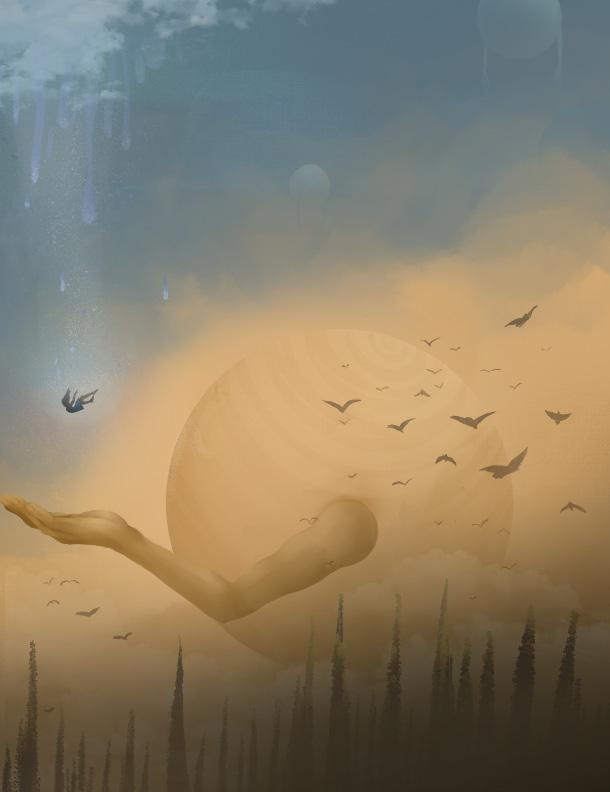
ARTWORK BY ANONYMOUS
There are beings older than life itself. Anos, Ruler of Space, Tisyn, Ruler of Time, Alina, Ruler of Light, and Zora, Ruler of Darkness. The Great Four. Primordial deities, whose domains stretch across all planes. You may invoke their names in battle or call out for them in prayer, but they will not respond. After all, why should the Primordial Rulers concern themselves with such trivial mortal affairs?
No one knows where The Great Four came from. Some scholars say that even the gods themselves do not know. All we know is as follows.
At some point, Anos felt a fifth presence in the celestial plane. And from the intertwining of Tisyn and Alina came Cara, One of Love, the oldest of the Ancient Ones.
Many more followed after Cara. Tisyn and Alina begat Ilena, the One of Growth, Enera, the One of Emotion, Idon, the One of Justice, Odis and Otia, the Ones of Memory and Myth, and finally, Chaya, the One of Life.
Anos and Zora begat Igyn, the One of Knowledge, Evis, the One of Aesthetic, Anella and Azrena, the Ones of Freedom & Fate, and finally, Aklys, the One of Death.
As the Ancient Ones matured, so did their duties. How lonely must it be, divine existence with no worshippers? Ilena, the child of Tisyn and Alina, was the first of the Ancient Ones to be given the gift of creation. Out of the empty void of space, Ilena formed a planet of growth. Stalks of wood sorrels as high as mountains crowned the forests, and the fields bloomed with grasses and flowers so tall you could swim through them. From Ilena's divine spark came the Dryads. The first followers.
Soon, the gift of creation was handed to all the Ancient Ones, save for Chaya and Aklys, the youngest Ones. It was not yet their time.
But power corrupts. And creation is a dangerous power to wield. Azrena was the first to fall to this corruption. After all, with the gift of creation and the threads of fate in the palm of their hands, the temptation for more became too much to resist. The control they could exert, the stories they could tell. The lives they could wind and twist and knit — it was exhilarating.
After Azrena, Igyn fell. With the gift of creation and all the planes' knowledge in the palm of their hands, the temptation for more became too much to resist. The control they could exert, the battles they could win. The people they could teach and trick and fool — it was exhilarating.
After Igyn, Evis fell. With the gift of creation and all the beauty of the planes in the palm of their hands, the
temptation for more became too much to resist. The control they could exert, the masterpieces they could paint. The vanity and ugliness and disguise — it was exhilarating.
After Evis, Enera fell. With the gift of creation and all the emotions of the planes in the palm of their hands, the temptation for more became too much to resist. The control they could exert, the agony they could bestow. The fear and joy and hope — it was exhilarating.
Ilena was left unharmed, uncorrupted.
Idon was left unharmed, uncorrupted.
Odis was left unharmed, uncorrupted.
Otia was left unharmed, uncorrupted.
Anella was left unharmed, uncorrupted.
Cara was left unharmed.
ON THE PLANET, SO THAT A BIT OF THE DIVINE SPARK RESIDED WITHIN EVERYTHING AND EVERYONE
While the others were corrupted, Chaya and Aklys found comfort in each other and soon fell in love.
With encouragement from Cara and the blessings of The Great Four, they were gifted a joint power of creation. Only with their partnership would this gift work. The Great Four hoped this union would protect the young Ones from corruption and save them from the fate of the others.
Together, Chaya and Aklys formed their own planet from the empty void of space. They called it “Ithea,” the Celestial word for “together.”
The pair saw how absolute power corrupted the others and knew they could not do the same. They breathed magic into every living thing on the planet so that a bit of the divine spark resided within everything and everyone. To celebrate their new relationship, the other Ancient Ones gave the happy couple some of their own divine spark so that their gifts could live on, uncorrupted and anew.

 ARTICLE BY KATHERINE LEONTE, DURHAM, NC
ARTWORK BY KATHERINE ZHAO, GREAT NECK, NY
ARTICLE BY KATHERINE LEONTE, DURHAM, NC
ARTWORK BY KATHERINE ZHAO, GREAT NECK, NY
The first thing she sees is the cup of coffee. Her hands are clasped around it, deliciously warm. The steam drifts leisurely into the air, a stark contrast to what she remembers from only moments ago — crystal clear ice underfoot, her breath lingering in the air, and a scarf wrapped around her neck, with endless stars littering the sky, the deafening silence, then — nothing. She can’t remember how she got there or what happened next. She takes in her surroundings, a sea of empty tables and chairs, lit only by the rosy glow of the fire. Beyond the panes of the windows, there is only darkness. The only thing she truly knows is the coffee shop and the table with two cups of coffee on it.
Wait, two? Her eyes narrow at the second cup. Surely, she would have noticed it before? Besides, she is the only one in the shop; she’s certain of it. Cups of coffee don’t just appear out of thin air. The hairs on her arms prickle, and she shifts in her chair. She wonders if she is truly alone, then feels ridiculous for entertaining the idea of an invisible entity watching her. Heat still soaks into her fingers, the coffee refusing to cool.
A clink rings through the shop, her head snapping back up as she’s pulled from her thoughts. Her heart races in her chest. Around her, nothing is out of the ordinary. Vaguely disappointed, she takes a sip of the coffee. Her eyes close in appreciation as she savors its richness.
When her eyes open again, a thrill goes through her chest. A stranger sits across from her, examining his own cup of coffee. She wonders if he even knows she’s here. The stranger wearily picks up the cup of coffee, taking a sip of their own. There is almost something lonely about them, she thinks, as if he were as lost as
she was. She tries to work up the confidence to speak. As the stranger sets his cup back on the table, their eyes meet. She tries not to startle. Looking into the stranger’s eyes was like looking into a kaleidoscope of memories; different rooms were reflected in each section, and she could see herself in none of them.
The stranger seemed like he could only truly belong in a dream, from his kaleidoscope eyes to how the edges of his figure seemed to blur when she tried to closely examine his appearance. There was something about him that did not fit within the guidelines of reality, of humanity, and it intimidated her. Everything in her system seemed to warn caution when it came to him. Across from her, the stranger intertwined his fingers, surveying her thoughtfully.
“Who are you?” she said, crossing her arms over her chest.
LOOKING INTO THE STRANGER’S EYES WAS LIKE LOOKING INTO A KALEIDOSCOPE OF MEMORIES
“I have many names,” the stranger said. “I am well known among your kind.” What did that even mean? She frowned.
“Humans, I should say,” he clarified.
“Is there any point to your vagueness?”
“Maybe,” he said, continuing to gaze at her. She was truly annoyed now at how this strange individual acted as if humans were a lower class. If this was a dream, she hoped she would wake up soon. She’d like to think her subconscious wasn’t secretly
a masochist, making her talk with the type of person she loathed.
“Why am I here?”
“Even I don’t know the meaning of everything, darling. I don’t know why you’re here,” he said with a sigh. Dark clouds flit across his eyes, and he leans back in his chair, crossing his arms over his chest. “You are simply stuck somewhere in the middle of two states.”
“That makes absolutely no sense. What states?”
“Life and death, I’d say,” he said, his eyes twinkling as if there was something funny about what he just said.
“You’ve lost me.” She shook her head.
“Let me tell you a story. A long time ago, Life and Death were companions. One day, Life was stolen away by time. Stricken, Death searched all over the world for her, but it was a fruitless endeavor. And still to this day, Death and Life remain divided.”
PERHAPS SHE IS A MERE MEMORY OF WHAT SHE WAS PREVIOUSLY. BUT THEN WHY WOULD SHE FEEL SO ALIVE?
“I've never heard of a myth with just Life and Death,” she said, convinced that he was just playing a joke on her.
The stranger sighed heavily and said, “Humans. Messing everything up with different interpretations. I am not multiple entities. I am a singular incarnation and have always been. Remembering all the names gives me a headache.”
“So that’s why you’re being so cryptic,” she said, slouching in her chair. “If you’re Death, then is this the afterlife? A coffee shop? Really?” Am I dead? She cannot remember dying. The very act seemed unthinkable to her. She could feel the life running through her veins at this very moment, a sort of buzz that would never die out.
Perhaps she is a mere memory of what she was previously. But then, why would she feel so alive? And why does every one of her senses scream at her to run, that something is catching up to her?
She barely has time to think it over before her companion is speaking again.
“Often, things are not as they appear. Places, people even. There’s something fascinating about you, darling, and you do not even realize it,” He takes a sip of his coffee, and she feels his multicolored eyes pierce into her own. “Usually, people see only what they expect. But you… in your presence, I cannot be anything but what I truly am.”
Silence falls within the coffee shop, only punctuated by the crackling of the fire. As time continues to pass, the minutes start to feel limited. She can feel her throat tightening. Something is off. Her heart pounds in her chest.
“Why me?” she said, fingers tightening around the cup. “Why am I the only one here?”
“I will not pretend to know how this works,” Death said. “Some wait years to arrive here. You came here instantly. Perhaps you have forgotten who you were. Who you are.”
“That’s impossible,” she replied. Sensations have started to come back to her, companions to the only images she can recall. “I remember enough.”
“Do you?” Death asked. She suppressed a shiver as his gaze settled squarely on her. “How does one not recall their oldest companion?”
The woman stared into the flickering flames behind her companion, uncertain. She remembers the exhilaration and adrenaline of running across an endless span of ice, the wind biting into her exposed skin. The catharsis of being able to feel so alive, feel so free in the universe. She remembers the sudden fear, her stomach dropping and her breathing becoming more shallow, as cracks spiderwebbed across the surface beneath her, with no land in sight. She experienced overwhelming devastation as she realized Time had caught up to her and that it might spell out her end.
“All I can remember is a land covered in ice. Nothing before that and nothing after that,” she said. Her companion’s eyes widen, and she sinks back into memory.
Each deafening crack echoes in her mind. She remembers tumbling into the water, gasping
from the sudden shock of cold. Trying to propel herself back up, but weighed down by layers of clothing, time seems to fly by as she struggles.
She remembers the ice sealing above her head like a seam being stitched back together as if it had never broken in the first place. Her despair as her fists fruitlessly struck against the ice. Closing her eyes, she sealed her last breath away. She remembers lying dormant in the frozen waters for years, her mind awake but her body frozen in time. Then, the ice shattered above her, weak sunlight filtering through the water nearest the surface. She was suspended upright in the water, ice clinging to the skin of her body, glittering in her hair.
A hand reached down into the depths and finally, finally grasped her hand. Death pulled her out of the water, disappearing from the coffee shop that he had endlessly waited in for months. Before she could express her surprise, the coffee shop faded to darkness before her eyes.
Life opened her eyes to see endless blue stretching above her. Her pulse fluttered weakly in her chest, and she breathed in the crisp air. Kaleidoscopic eyes stared down at her, and this time, she could see herself reflected in them. How ironic, she thought, that Death would be the one to save Life. Finally, she realized her mistake. As long as Death was by her side, Time would never catch up to them again.

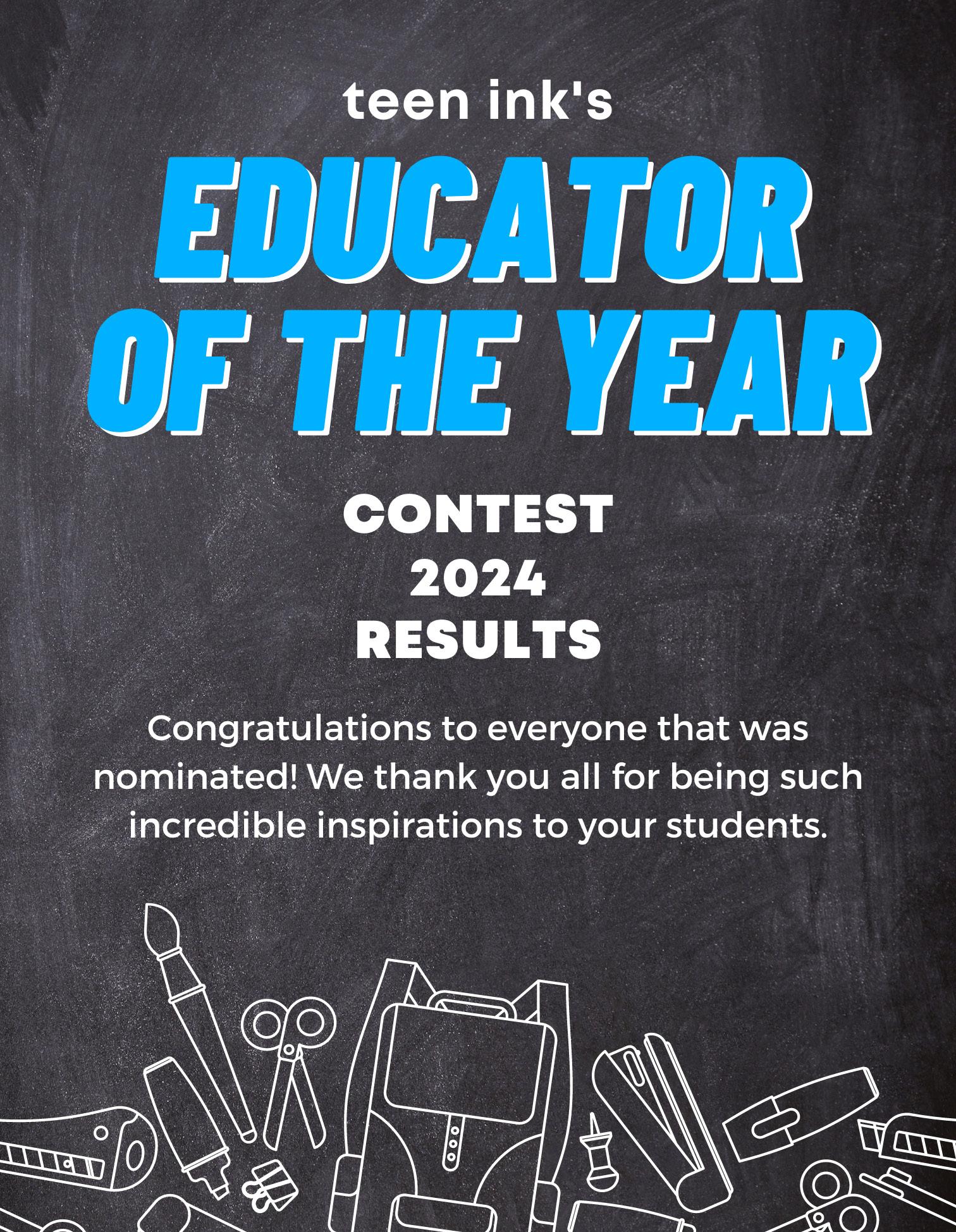

It is universally acknowledged that high school is one of the most difficult experiences in a young person’s life. Nothing could be more intimidating for a middle schooler than confronting that vast, tumultuous sea of future responsibility. Every freshman is forced to ask themselves: Who am I going to be?
Two years ago, when I was in that position, I had no answer to that question. After spending the entirety of the 2020-2021 school year in my bedroom and attending middle school through a computer screen, I was terrified of starting high school. I could not have navigated that maelstrom if not for the guiding influence of the absolutely incredible Mr. Hanks.
In my freshman year, I was enrolled in Mr. Hanks’s 8th Period Advanced Biology, and his class was, without a doubt, one of the most valuable classes I have ever taken. Mr. Hanks did not begin biology with a lecture or worksheet. He began it with a question. At the start of each class, he would put a question on the board and then go to every table to ask for our responses. And the questions he asked — “What makes you irrationally happy?” “If a movie were made about your life, what actor would play your role?” “What is something I don’t know about you?” From the outset, I knew his class was something special: Mr. Hanks cared about each of his students as human beings.
Biology can be a complex subject, but Mr. Hanks made learning effortless with hands-on experiments and creative projects. I’ll never forget the lesson on alleles, which involved designing and drawing a monster (and yes, I still keep my illustration of Ms. Beatrice, Consumer of Worlds, in my room). Because of his continued support and enthusiasm, I found the confidence to continue to take challenging science classes. When I was a freshman, many people told me I’d fail if I signed up to take AP Environmental Science my sophomore year — but Mr. Hanks not only said I could do it
FROM THE OUTSET, I KNEW HIS CLASS WAS SOMETHING SPECIAL: MR. HANKS CARED ABOUT EACH OF HIS STUDENTS AS HUMAN BEINGS
but that I should. I did, and I’m so glad I took that step to learn more about the natural world. I’m currently taking AP Physics 1, and I could never have gotten here without Mr. Hanks.
But most importantly for me, he created an environment where I, a painfully shy 14-year-old, felt safe enough to make lasting friendships with my classmates. The isolating COVID-19 lockdowns had left me feeling incapable of forming meaningful human connections, but in his class, we were encouraged to collaborate and interact. My tablemates from that class remain some of my greatest friends.
Mr. Hanks is funny, genuine, and worthy of recognition. Because of his class, I know who I want to be: I’d like to be someone like Mr. Hanks.
Every student comes across countless teachers throughout their education. However, there are only a few who can leave a lasting impact on your life and motivate you to push through your struggles. My current 8th grade English teacher, Mrs. Hernandez, is one of the select few who leaves you inspired. Mrs. Hernandez is a unique teacher who not only allows flexibility in the classroom with the activities done but also introduces engaging activities that improve one’s skills.
To commence, I used to think writing was not my strength, which it isn’t, but her lessons helped me regain the confidence I had lost due to a negative relationship with my dad. One example of how I was able to regain my confidence is when she has us journal every week for 10-15 minutes, and she occasionally reads from her journal from her teenage years. That particularly helped me as I could relate to her feelings, as her parents also immigrated to the United States. The things she went through as a child and the feelings she felt were relatable, and listening to how she overcame her issues was uplifting. We also had a mini-lesson on poetry where she printed out the lyrics of a song, “Papercut” by Linkin Park, to show how songs we listen to in our day-to-day lives also have a poetic angle to them, in the sense that they also have a deeper meaning that we can read “in between the lines” with. Mrs. Hernandez also gave us an opportunity to interview someone close to our heart and write a paper about them to inform people about the person we chose to write about. This gave me an opportunity to write about my maternal grandfather, who went through many struggles from an early age to survive and flourish. Being able to interview him was an experience I will remember my entire life.
Additionally, she also helps students come up with solutions to any of their problems. After we write in our journals, she reads them when we allow her to, and she comes up with a well-thought-out response for us to improve our situation. She also has ways of discipline without being strict. For
MRS. HERNANDEZ IS A UNIQUE TEACHER WHO NOT ONLY ALLOWS FLEXIBILITY IN THE CLASSROOM WITH THE ACTIVITIES DONE BUT ALSO INTRODUCES ENGAGING ACTIVITIES THAT IMPROVE ONE’S SKILLS
example, we have state testing in two weeks, so she introduced a series of games in which teams work together to represent a county of choice. She somehow manages to find a way to change even your worst nightmare into the best day.
In conclusion, Mrs. Hernandez should be declared the “Educator of the Year” because she has the ability to change the course of one’s life, and she chooses to do so in a positive way rather than other methods that would be harder and more dreadful. Moreover, she should win because she’s a teacher who says, “Okay, here’s the problem I’ve been noticing that you’ve been facing, and here’s what we can do to improve it.”
Educators possess the ability to leave an irreplaceable mark on our lives, shaping our journey in profound ways. For me, this figure was Mrs. Kerr, my sophomore-year biology teacher at Arrowhead High School. Despite being hired the second week into the first semester, Mrs. Kerr's impact was immediate, allowing me to embark on a journey of learning self-advocacy — forever shifting my life.
Growing up with ADHD and anxiety created the fear of asking for help and self-advocacy. I found myself lying low, barely getting by. I knew I had to do something about it, so I emailed her asking for help (avoiding face-to-face confrontation). As I nervously read, “Come in at lunch,” I felt a wave of relief come over me.
I walked into her classroom — her face beaming as she was so happy to see me! I pulled a chair up to her desk, and she helped me better understand the cell. Usually, I feel judged when I ask questions, but with every question I asked, I felt free to be myself.
Walking out of her classroom, I learned she was the only teacher to take the time to read my 504 plan, an effort that is HUGE to me. Throughout the school year, she worked extremely hard to accommodate my 504 plan and ensure my needs were met.
HER DEDICATION, PASSION, AND UNWAVERING SUPPORT HAVE NOT ONLY SHAPED MY ACADEMIC CAREER BUT ALSO INSTILLED IN ME THE LIFELONG LESSON OF SELF-ADVOCACY
Mrs. Kerr nurtured me, checked on me, and cared for me like I was her third child. Although she didn't talk much about her personal life, she shared that she has two kids and is happily married to her husband (who also works in education as a principal). She is not only a loving mom but also a beacon of light to everyone around her.
Despite my self-doubt in biology, Mrs. Kerr always believed in me and my potential — something I didn't recognize in myself at first. Through her encouragement and checking in on me, she helped me to realize the importance of believing in myself and develop the confidence to pursue help, even when it made me uncomfortable.
As a senior reflecting on my journey throughout high school, I am filled with gratitude for the impact Mrs. Kerr had on my life in such a short amount of time. Her dedication, passion, and unwavering support have not only shaped my academic career but also instilled in me the lifelong lesson of self-advocacy. She taught me that true success and happiness come when you ask for help, a lesson I will forever be grateful for.
Mrs. Kerr is more than just a biology teacher, she is a mom, a friend, and a life coach. She is a light switch for transformation; my switch was down when I met her, but it has been turned on since leaving her class. Through her guidance, I have not only learned biology but also the invaluable life lesson of self-advocacy. Everyone needs a Mrs. Kerr, and I am forever thankful I have her in my life.
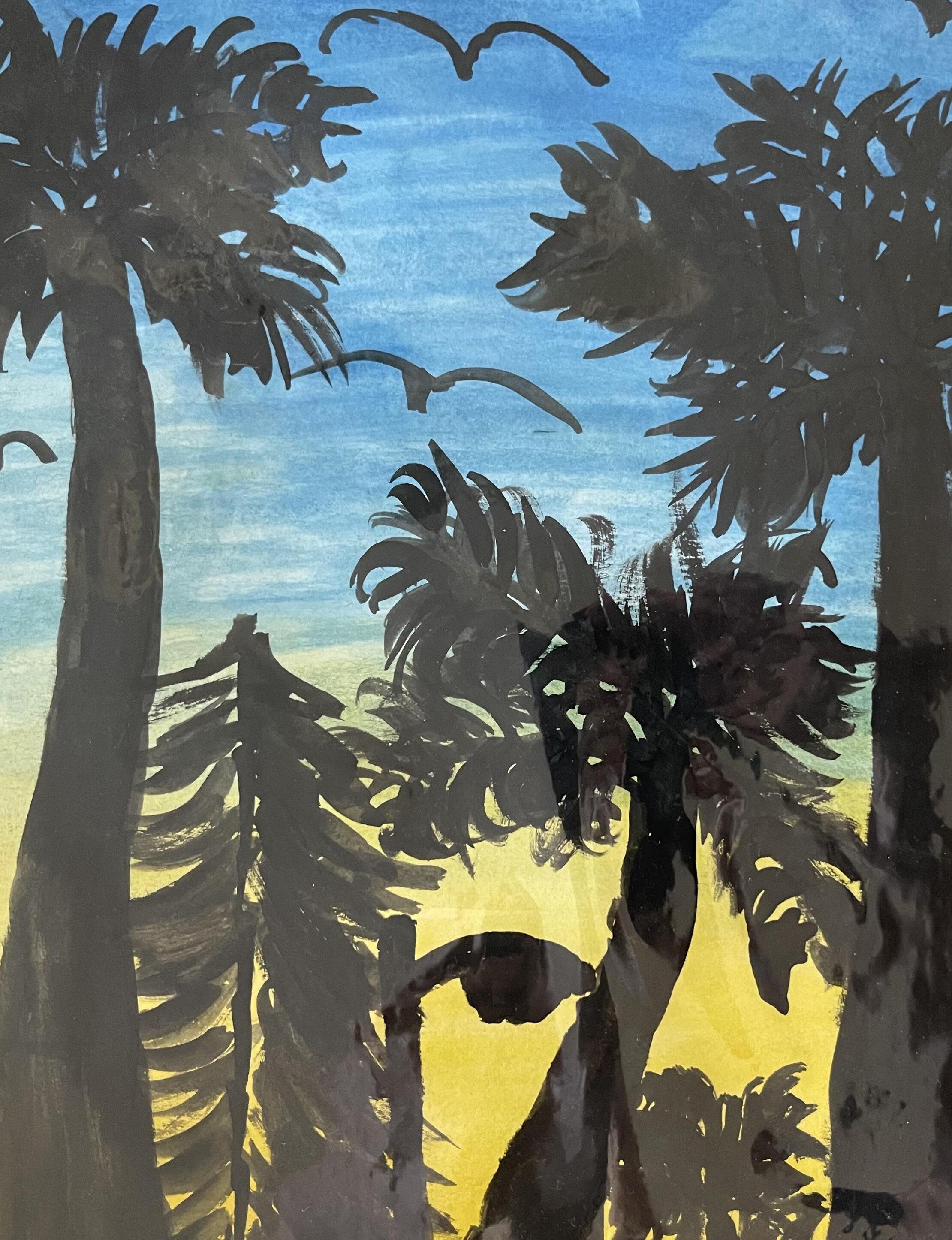

I had studied all night for my fourth-grade map quiz. With the tune of the “Fifty States that Rhyme” song on repeat, I made my way around America’s coastlines. Our task: to label a blank map of the U.S. with the appropriate states and capitals. I remember agonizing over Nebraska and Kansas, Illinois and Ohio. Most students probably have memories of a similar assignment. But as I read a recent New York Times article on the history of Guam, I realized there’s far more to the map than the 50 states.
America has a long history of oppressing Guam ever since we colonized the region in 1898. Guam now has over 160,000 residents and is also home to 6,000 U.S. military personnel. Daily life in Guam consists of never-ending military activity, with Air Force jets flying overhead each day and a strong naval presence at sea. According to The Associated Press, members of the U.S. Air Force, Naval Base, and Coast Guard combined take up almost 30% of the island, and the U.S. military hopes to grow its influence on the region in the coming years.
Even though Guam is technically part of the United States, it has very little power. For example, Guam’s delegate in the House of Representatives is a mere figurehead, someone who can’t even vote in elections, when that’s what the entire point of a delegate is. We call residents of Guam “citizens,” but they don’t have the rights that are promised to American citizens.
As Tom Lin remarked in his article in California Law Review, “This kind of second-class status is not how our government is supposed to work and it has real implications.” Because the people in Guam cannot vote in elections, it is difficult for them to change their reality. For example, for several years, Guam has had an unemployment rate that is higher than the
national average, but little is being done to improve its economy, and its limited government has no power to change this. These representatives may voice a desire for a different life, but because they lack voting power, they cannot do anything to create a better living situation for the residents of the territory.
Furthermore, the U.S. is making decisions that end up oppressing the people of Guam. I was shocked to learn that Americans outlawed the CHamoru language and that the CHamoru cannot vote, even though CHamoru is the majority indigenous population of Guam. Technically, this Pacific island community is a U.S. territory. So why are places like Guam, Puerto Rico, and the U.S. Virgin Islands not on the maps students study every year? And why do we rarely learn about them in history class?
We see America as a free, inclusive, open nation. We see this kind of imperialism as something of the past, something we disapprove of because of our history with the U.K. — but the reality is that oppression is happening on our soil, by our own hands, and it has been for over a century. America has come a long way since Biden declared Indigenous Peoples’ Day a holiday, but it’s time we start honoring America’s unincorporated territories, too.
Maybe the next time we rattle off states and capitals, we can put Guam on the map; it deserves to be there, after all.
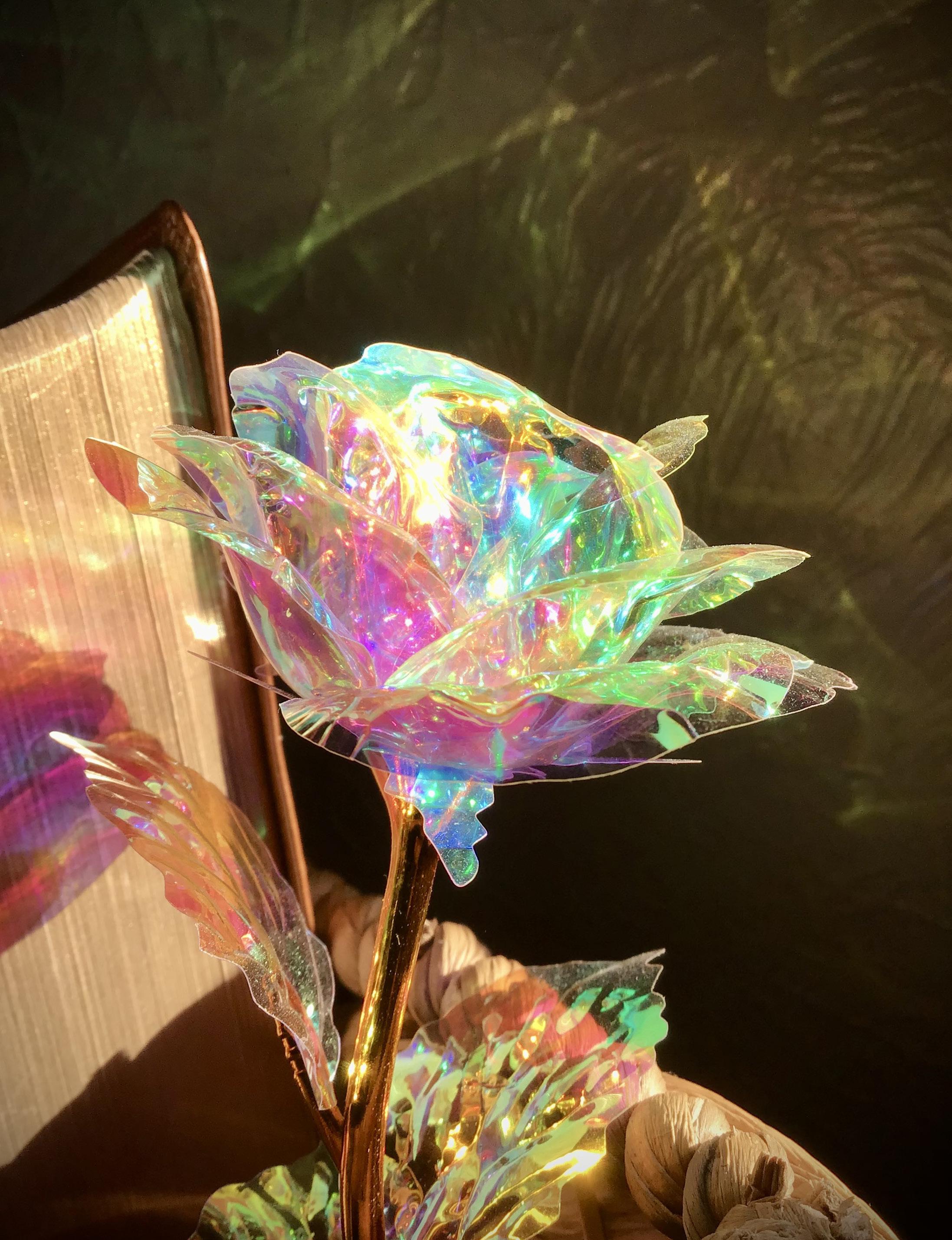
Katniss, Peeta, Gale. Bella, Edward, Jacob. Belly, Conrad, Jeremiah. The names change, but the trope remains the same — a girl caught be- tween two equally enticing boys, with the author dropping not-so-subtle hints through-out the series about who will win her heart in the end.
In a society filled with young adults struggling to maintain just one romantic relationship, the last thing we need to read about is a girl juggling two. This narrative often sends a troubling message about cheating: infidelity is acceptable in the pursuit of true love.
Additionally, as the main character switches between her love interests, the gap between fiction and reality widens. These fictional men display an almost unbelievable level of understanding, seemingly unfazed by her indecision and the emotional turmoil it causes. Audiences swoon over the romance. That is, until they consider how they would feel if their significant other behaved similarly.
These unrealistic expectations are further reinforced in the protagonist at the center of the love triangle, who is often pampered and spoiled. Some may argue that these expectations are important as society has set the bar for dating too low; in turn, these indulgent instances are required to build up habits of expressing love and care throughout the relationship. So, this is not to say there is nothing to learn from love triangles.
Admittedly, love triangles can remind one boy that his love for the girl is only on the surface, and he does not care for her as much as the other could. This realization highlights the value of relationships, an important lesson about balance and care on both sides. Relationships are a two-way street that doesn’t include a U-turn option when the girl is ready to try out the other guy. However, even with the possible epiphany of what counts as true love and the
emphasis on consistency, a person cannot rely on those reasons alone to justify a love triangle.
The uncertainty faced by all three characters involved in the love triangle is unhealthy for the emotional capacity of a teenager. From a psychological perspective, the deficit of self-esteem and overburden of jealousy is extremely distracting to other priorities, such as the character’s education. If you were picked to be in The Hunger Games, would you have time to fret over the pros and cons of being with your survival partner or childhood best friend? The dilemmas faced by these characters offer a rose-tinted view of the reality of managing relationships.
a child’s well-being during their early development, few brothers will threaten their bond to compete over a girl.
Love triangle authors also tend to diminish all three love interests to the point that audiences are rooting for the awkward, fourth side character only brought in to serve as a reminder of what a good boyfriend should be like — the other two, get your heads out of the sand! The love triangle only reduces the authors’ writing quality, and I promise the extra 20 pages of back-and-forth indecision are unnecessary.
The addition of love triangles in the later seasons of a television series also feels tacky. The show seems to
Even more concerning is the tendency for love triangles to prioritize romantic relationships over familial ties. In The Summer I Turned Pretty, a coming-of-age romance, two brothers, Conrad and Jeremiah, compete for the affection of their childhood family friend, Belly. When Conrad sees Jeremiah kiss Belly, the plot turns into a spring semester filled with tension between the once tight-knit brothers. Though the brothers were facing their mom’s recent passing due to cancer, the trauma was overshadowed by romance, another situation that is only normalized because of fiction. Furthermore, how often do you see two brothers going after the same girl? Evolutionary psychologists share a common view developed from Darwin’s first ideas on survival: love is an adaptation to reproduce for survival purposes. However, because family structures provide the resources necessary for
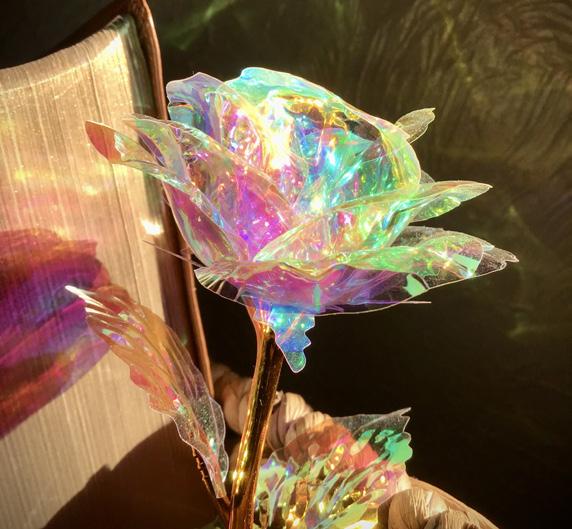
make a joke out of the past three years you spent watching the characters connect. It undermines the investment viewers have made in the character’s emotional journey, reducing it to a punchline, especially when it is obvious that the original pair will end up back together.
Overall, the inclusion of love triangles in media has attracted fans for the wrong reasons: glamorized cheating, indecisiveness, broken family bonds, and pointless additional pages. All of these ideas have cemented a line between what is appropriate in fiction and what is appropriate in reality. The next time you cheer on a complicated love triangle in pop culture, consider whether you are only validating the situation because it is made up.
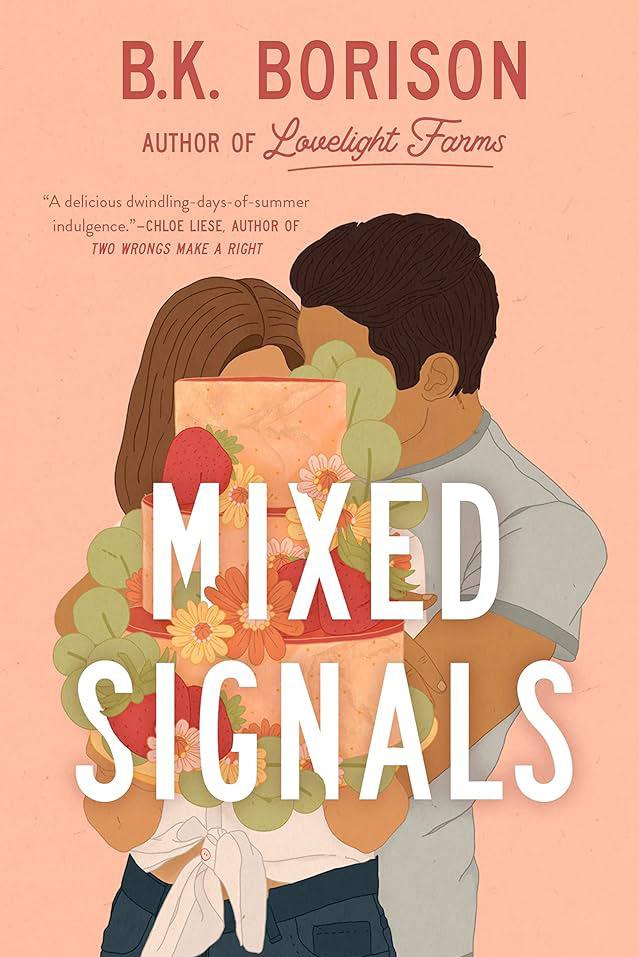
Mixed Signals by B.K. Borison is a sweet and cute rom-com full of humor, suspense, friendship, and love.
The book starts with the main character, Layla, stuck at a bar with a bad date. I wasn’t the biggest fan of her at first; she seemed judgy and unhappy about the smallest thing, but I enjoyed watching her character develop as the book progressed.
AUTHOR B.K.
BORISON
IS
A
Caleb is a super nice guy — maybe too nice for his own good. Dropping everything he's doing, he takes Layla home. On the way, Caleb strikes up a deal with Layla to help one another with their dating lives. He takes her on dates so she knows what it's like to be treated well, and she rates how he did so he can learn not to overthink relationships. All this with no strings attached between them — seems simple enough. I mean, if someone (who I genuinely like) wants to take me out on dates, I would say yes so fast.
Though, it's not that simple — and it gets confusing for them both. Throughout the whole book, you see Caleb be the most perfect guy someone could ever be, and you instantly ship them together (and you want him for yourself). Caleb is so hard on himself and is scared that he messes up when it comes to dating. Layla shows him that he has nothing to worry about and that he is incredible, while she thinks she doesn't deserve a good person to be with — and Caleb is desperate for her to see she does. The character development is really awesome and this book has a lot of side plots involving Layla and her bakery. Because of this, you don't get bored and you get so invested in their lives. All the friendships and relationships that you see intertwined with the book make your heart warm and it just makes you believe in love.
Author B.K. Borison is a phenomenal writer, and her love stories are wonderful. She expresses the characters' emotions beautifully, and the dialogue she
PHENOMENAL WRITER, AND HER LOVE STORIES ARE WONDERFUL. SHE EXPRESSES THE CHARACTERS' EMOTIONS BEAUTIFULLY, AND THE DIALOGUE SHE WRITES FITS PERFECTLY WITH THE STORY
But when the male main character, Caleb, walks up to Layla at the bar like a knight in shining armor, you instantly fall in love with him. He is joyful and outgoing, and he cares about everyone, especially Layla.
writes fits perfectly with the story. I'm so glad I decided to pick it up before any of my other unread books, and I can't wait to read the other two books the author has in her Lovelight book series.

Children with tails and telekinesis — this is what Linus Baker deals with on a regular basis. Although used to the unusual affairs that accompany being a caseworker for magical youth, he finds that his most recent assignment is unlike any other. With its amusing characters and magical attributes, The House in the Cerulean Sea by TJ Klune is a charming and comical book that displays problems faced in the real world.
Because it's a fantasy novel, The House in the Cerulean Sea contains many impossible scenarios. Picking
up this book, I wasn't sure what to expect when it came to the fantasy aspect, but it ended up being quite interesting. The story takes place in a world full of magical beings and superpowers. Natural elements are protected by sprites, creatures equivalent to fairies. There are shapeshifters, gnomes, and many more. The House in the Cerulean Sea definitely gives a unique spin on fantasy that I haven't seen before.
The best quality of The House in the Cerulean Sea is its characters. Linus's assignment takes him to a strange orphanage situated on an island, and right away, it's obvious that it isn't normal. With six exceptional kids and a mysterious caretaker living at the orphanage, it's impossible not to fall in love with each and every one of them. Their differing personalities and individual abilities made the story so entertaining to read.
A major theme of the book is that not everyone's family is the one they were born into. Many different relationships grow over the course of the story, and eventually, the characters become a sort of unconventional family. It was heartwarming to see a friendship grow between Linus and all of the children despite his being so professional and career-oriented. The kids are also hilarious, adding just the right amount of comedic relief during more serious moments.
Many of the issues in The House in the Cerulean Sea can be seen in real life. Though the book takes place in a universe with so many amazing and magical beings, humans in the story are very quick to judge and condemn them, saying they are monsters. Linus realizes this as he gets to know the children and sees what they have to endure. Problems like this also appear in the real world, just without the superpowers.
Along with the magical characters, the found family theme and display of real issues made for a beautifully written story. TJ Klune did an
outstanding job crafting a captivating world and writing loveable characters. While I wasn't sure about the plot at first, I really came to enjoy it in the end. The House in the Cerulean Sea is the perfect book for any reader searching for a sweet and humorous story.
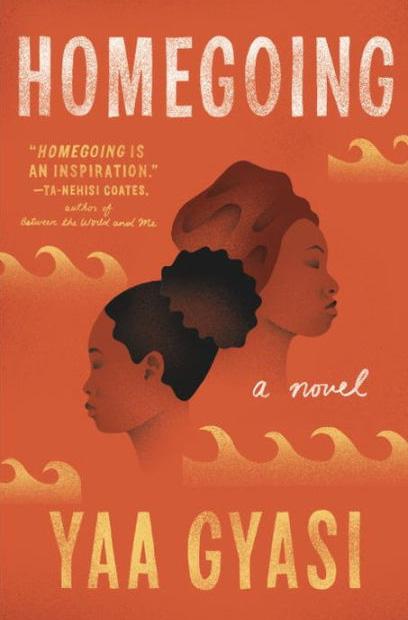 by Yaa Gyasi
by Yaa Gyasi
Yaa Gyasi’s Homegoing isn’t just your average novel. It's a captivating journey through time and legacy. In its few hundred pages, it holds the culture and history of a whole continent: Africa. This masterpiece takes the readers through the corridors of history and the tapestry of human experience.
Yaa Gyasi tells the story of Effia and Esi, two sisters living in 18th-century Ghana. Although they share the same blood, their stories are totally different. Effia is married to a British slave, while Esi is sold into slavery in America. That’s the breaking moment in the storyline, where it
splits in two. The book follows the descendants of these sisters over several generations, exploring their experiences in Africa and America.
The young author uses a quite revolutionary and engaging writing style in this piece. Each chapter introduces a new character, allowing us as readers to explore how the family's history unfolds over time. I have never seen such a style. In the beginning, it might feel sort of abrupt and unconnected. However, as you move through the first couple of chapters, it all starts to slowly make sense and intervene. This way, Yaa Gyasi tells us countless small stories and encounters while also building a bigger picture. It’s like a puzzle. Moreover, Gyasi’s writing is extremely descriptive and emotive, literally teleporting the readers to the setting and scenes of the novel. Throughout every word, Gyasi's prose is always evocative and immersive.
Some of the major themes in Homegoing are heritage and identity. By tracing the lineage of a single family over several generations, Gyasi reminds us that although the sisters' lives are vastly different as they endure endless struggles, they are still interconnected by sharing culture, race, history, and blood.
Moreover, Homegoing can give today’s readers a glimpse of the horrors of slavery and the challenges of identity. We witness the struggles and triumphs of these characters as they grapple with the legacy of slavery and colonization. Although separated by the Atlantic Ocean, the characters of this novel share and
fight through the same struggles and misery. This novel shows one of Gyasi’s strengths as a writer: her ability to humanize history.
We feel bad and almost feel the characters' pain, whether emotional or physical. It’s truly a unique experience. We see how historical events shape the lives of ordinary people and how the past continues to influence the present.
In conclusion, Homegoing is a must-read for everyone who values books that bring up true and pure human emotions using simple pages and ink. This novel deserves to be read and discussed in today's world, where issues of race and identity continue to be important topics of conversation.
struggles but finds joy in a single pencil. This empowering story takes place in early 2003 in western Sudan, a country in northeast Africa. It tells the compelling story of a girl named Amira and her family. They lived on a farm in south Darfur, Africa. Amira has lived there her whole life with her best friend Gamal and little sister Leila.
Amira and Leila’s parents told them about the Janjaweed in case they ever came. The Janjaweed are bad. They go into farms and towns to terrorize, steal, and kill. One quiet night in their town, the Janjaweed led Amira and her family to flee to a concentration camp. One thing Amira loved was drawing. When she lived on her farm, she always drew in the sand with a stick. Upon arriving at the camp, she felt upset and overwhelmed.
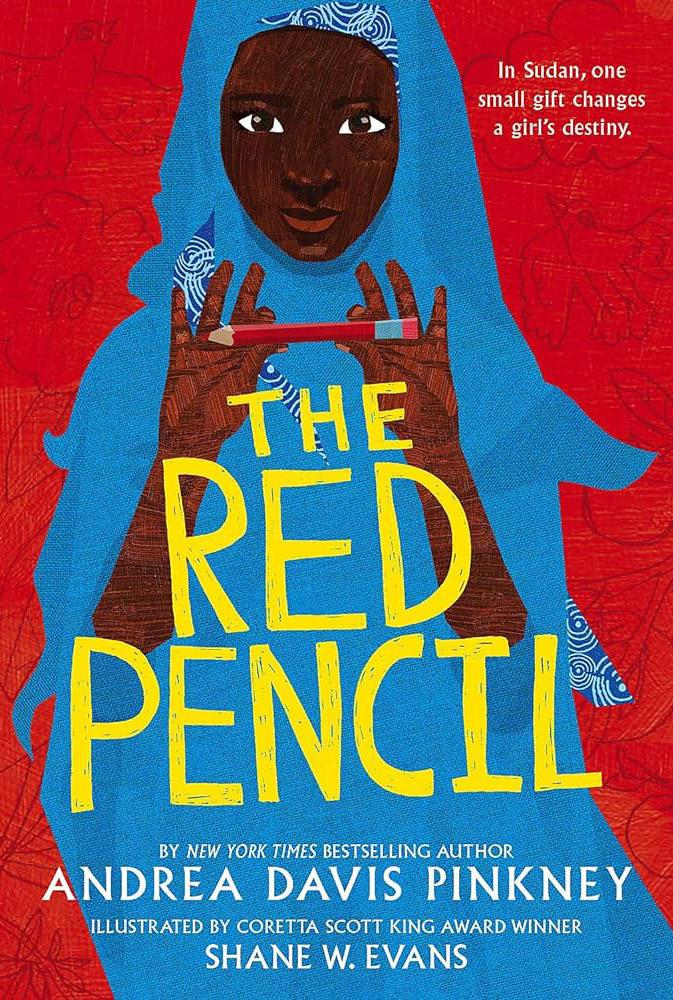 Andrea Davis Pinkney
Andrea Davis Pinkney
Once they got there, a woman named Miss Sabine arrived with two bags full of notebooks and pencils. Each child in the camp receives a pencil and notebook. Once Amira got her notebook and pencil, she learned new things she didn’t know before, considering what else was possible.
This novel helps readers understand the struggles of people in Africa and other countries. It shows how a simple thing that readers may have can make a big impact on a child from Sudan and other places in the world. Some may find the plot interesting because of how different someone’s life can be and all the difficulties the character Amira went through. The characters are all very different, which makes the novel unique. It’s different from an average novel because it's written in a poem style. It can and can help depict different images and how characters express their emotions.
When buying a book, do not leave this one back on the shelf.
The Red Pencil by Andrea Davis Pinkney is a historical fiction poem about a girl who has many life1. PHOTO BY JENNA GILMARTIN, SPARTA, NJ
2. ARTWORK BY SHIVIKA PANGHAL, CHADDS FORD, PA
3. ARTWORK BY VARSHA OMKAR, DENVER, CO


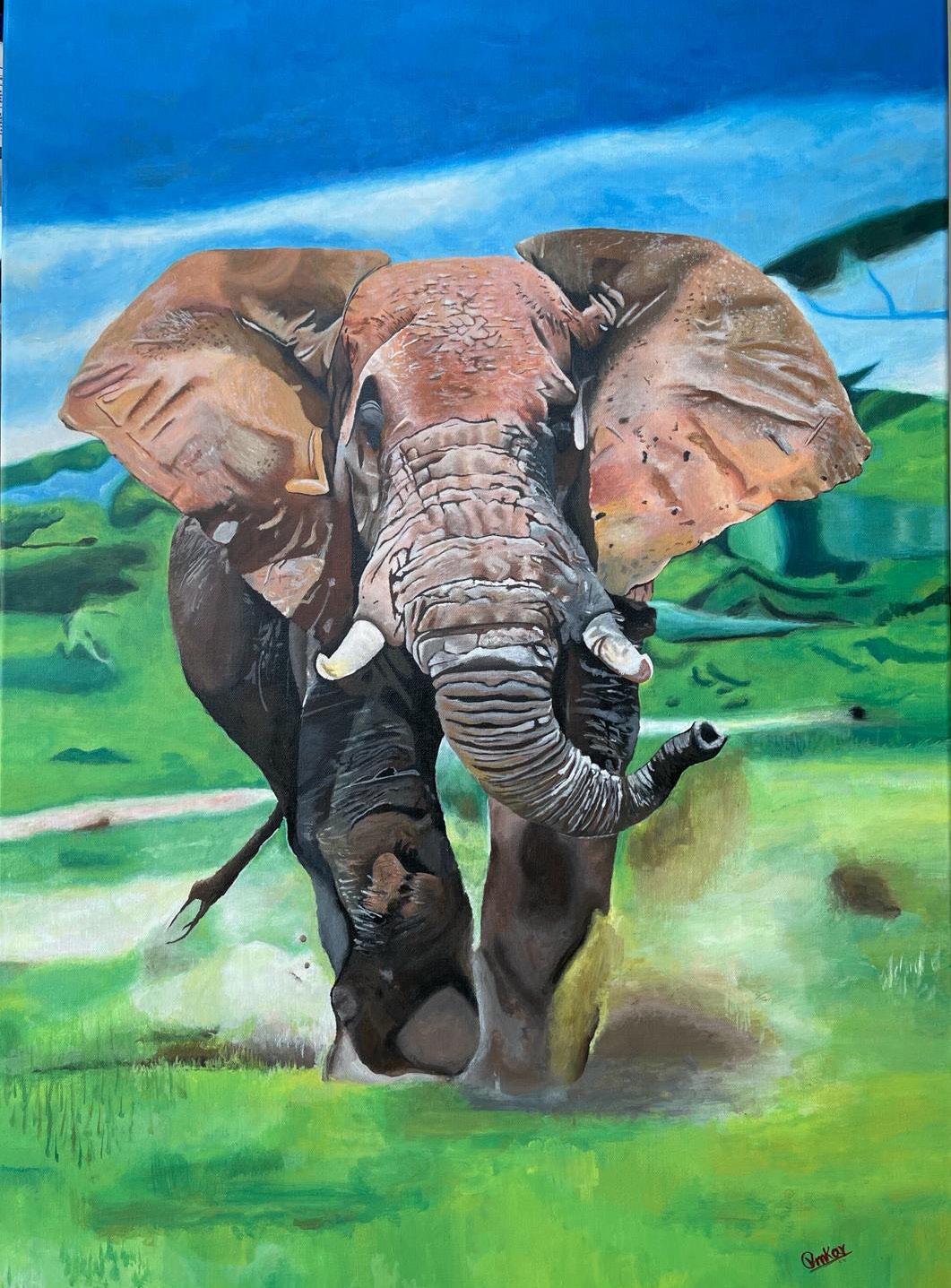


1.

VILLA

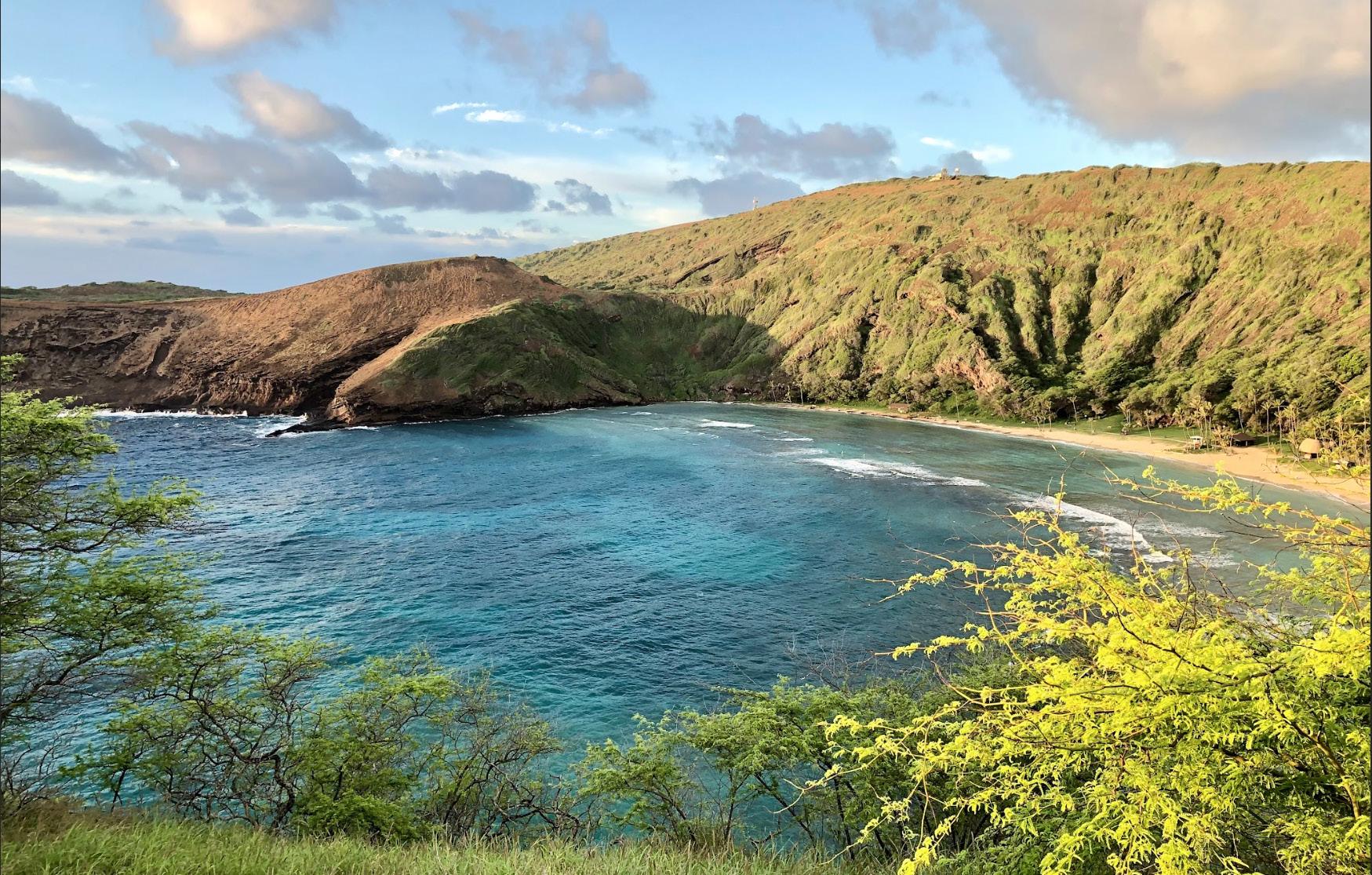
1. SPLASH MOUNTAIN BY RINTARO HIROTA, TOKYO, JAPAN
2. OCHRE BY RORY TOBIN, BOWIE, MD
3. AUDIENCE BY LALA WU, HARTSDALE, NY
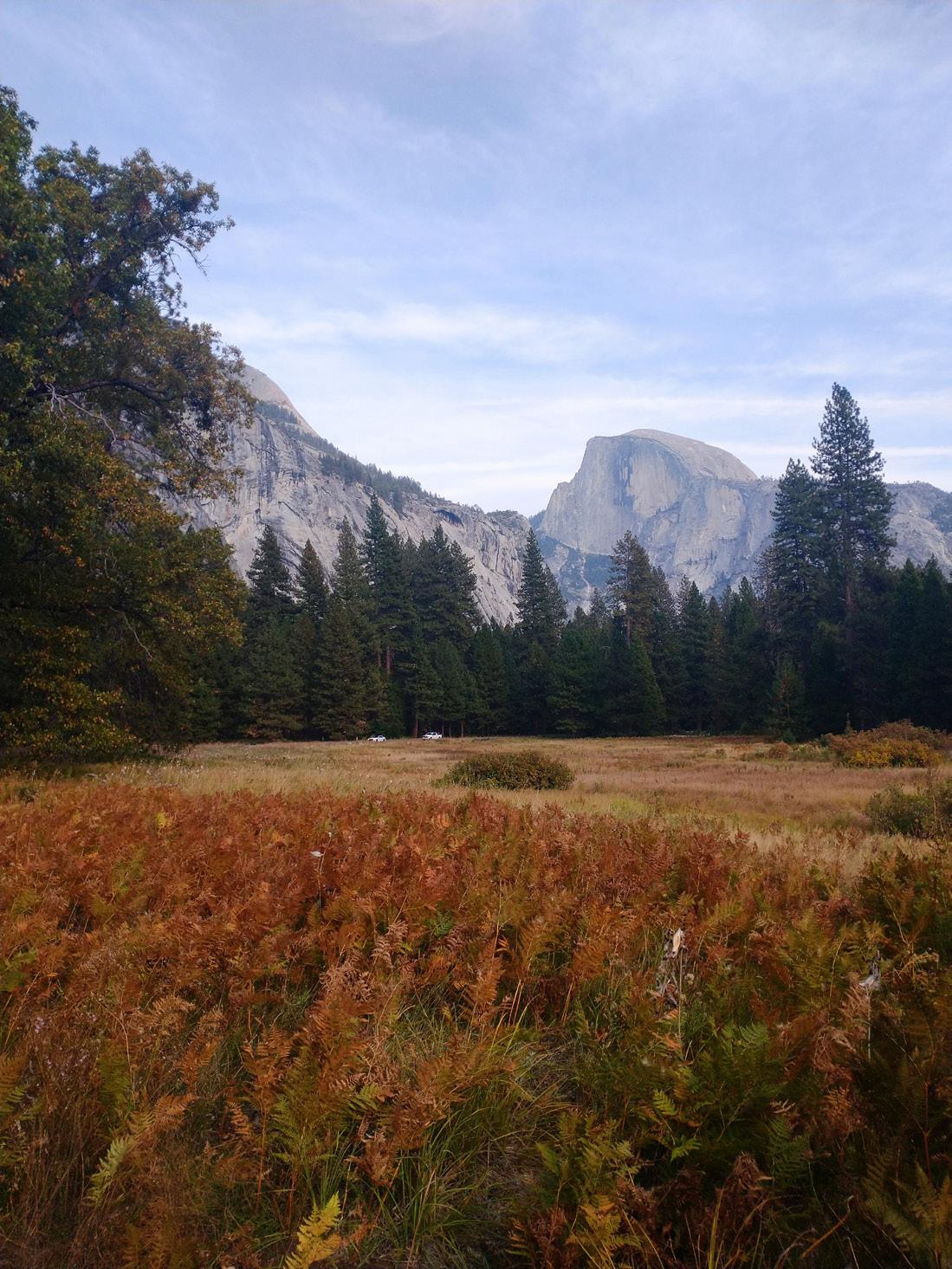



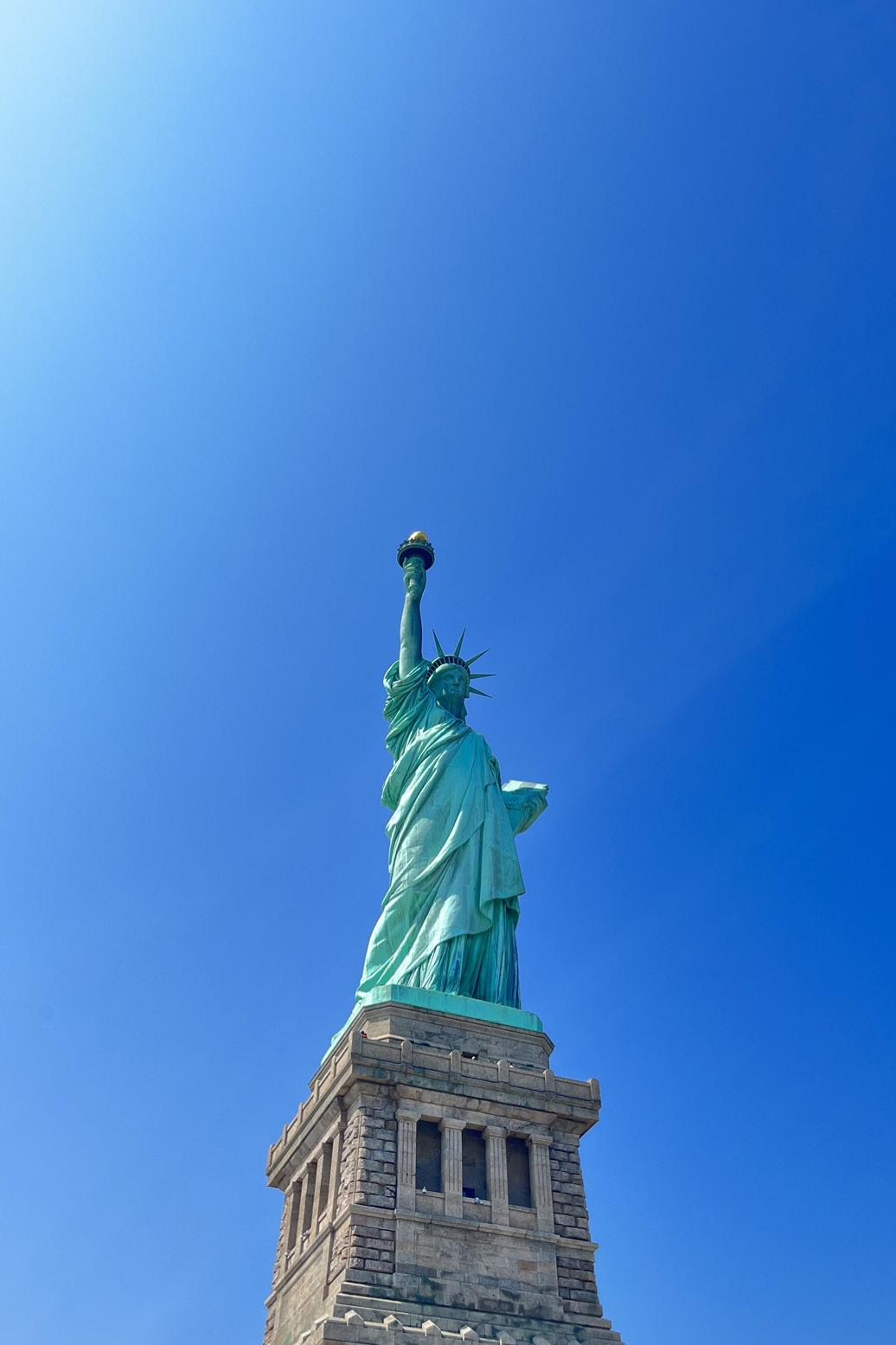

Bunsen burners, now replaced by a tea kettle lab gloves, oven mitt
Layering pasta sauce and cheese to bake on high. An hour, waiting
Questions boiling: Why put me in the kitchen? How can I escape?
The oven timer rings, your questions unanswered–mitts, pencil, paper.
Your experiments, written on recipe cards archived for science.
BY CAROLINE GORDON, NYC, NYMamá … why did you not think of teaching me Español?
Papá … why must I feel so foreign to my own cultura?
No sé. No entiendo. No soy de este planeta.
BY ALVARO ARAQUE, SUSSEX, WI
I want a house
With a record player in every single room
So that I can shoot songs from the hip
And sing through my paper-thin doom
I want a house
Whose doors are stoic and wide Whose gilded, lockless handle Smiles in warning of what goes on inside
I want a house
That waits by the water By a river that would welcome my reflection
And drown all those silly souls that sought her
I want a house
With a heaven-high steeple Because I’d climb a thousand steps
To get away from you people.
BY BRIDGET CARR, WYCKOFF, NJColors paint the world, Nature’s artistry in full, Pretty petals bloom.
BY ANONYMOUSIn spring nights, a dense fog rises from the woods. Made up from the sound of wood frogs, it floods the neighborhoods.
Received with a closed door, windows shut and locked. They don’t hear the frog’s score. The sound of spring was simply stopped.
Shut windows shut pipes, no audience. They pack up on nights that lack a dance, yet frogs hold no gripes with me or you. They’d sooner forgive than give forever “adieu.”
So listen close, relive, realize, those raspy tones, amphibious lives, spread every peace on planet earth, get less respect than what they’re worth.
BY ANONYMOUSi wonder if you know me when you look at me what version do you see what story have you written to explain me what’s my reason, what’s my life what color air do i breathe, what type of sights do i see who’s past did you interweave with mine what experience is now mine and what am i to you what role shall i play in your autobiography will i be the knight in shining armor or the fire breathing dragon am i the delicate princess, the daring knight? perhaps i am the evil stepsomething, or the caring fairysomething am i a replication or a replacement? do i fill the void someone else left behind or do i simply cover it up? do you see me when you look at me? or do you see what you want me to be? (they’re practically the same thing now).
BY FINCH ELIA, SCITUATE, MAIt is responsible for measuring anything: How high is the sky, How thick is the ground, How long is your life, How far is your dream. Even,
The width of your eyesight, The prospects you query, The region you are not allowed to cross.
When I keep distance with it, It becomes a stick To beat me hard.
BY TASHA YANG, BRIGHTON, UNITED KINGDOMYou are the daughter of the moon and sun you are flowers in spring and you are sunsets in late summers
when people talk about beauty they imagine you You are the creature most deserving of love my heart dies a little every time I see you smile
I wanna be you you are the art you are what makes life worth living you do not need to scream to be heard
I am just a poet I only exist in my words I am too scared to live my poetry I am only allowed to look at you and wonder if you really smell like strawberries and rain.
BY ANDRY CATSON, PRAGUE, CZECH REPUBLIC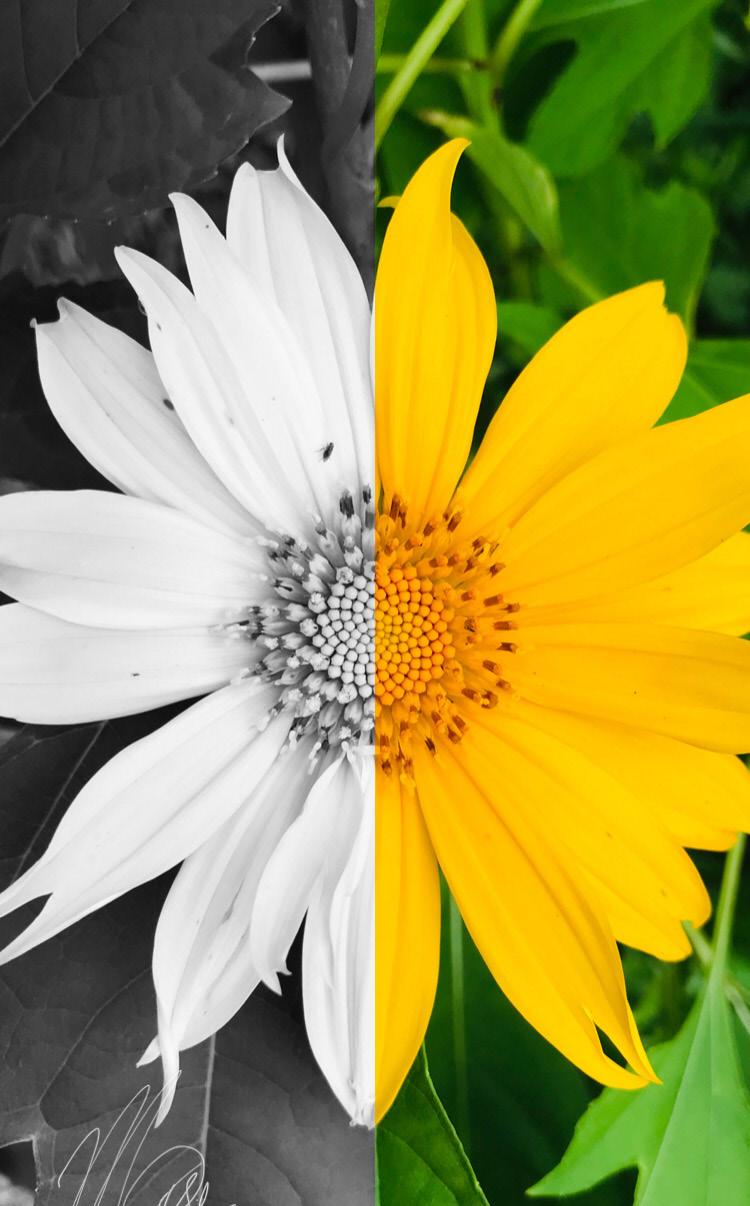
“When (I) come to it (I), this (person), on this wayward, floating body
Created on this earth, of this earth
Have the power to fashion for this earth
A climate where every man and every woman
Can live freely without sanctimonious piety
Without crippling fear.
When (I) come to it (I) must confess that (I am) the possible (I am) the miraculous, the true wonder of this world
That is when, and only when (I) come to it.”
I will always work hard, Putting in hours upon hours of effort
Like a sailor navigating the endless ocean, Wandering aimlessly in a hopeful direction. I want so much for myself and this life, It is a tough feat to be successful But what is success but a construct,
A mirage in the desert of existence?
I must define success but in moderation, Do not expect everything to be an easy trail But rather a path through a dense forest,
It is one with twists and turns, Trials and tribulations like storms on a mountain climb.
But when I come to it, all will be astounding, As if I’ve found an oasis in the vast wilderness. When I come to it, I will be whole, Like a jigsaw puzzle completed, each piece a chapter of my journey.
BY NATALIE NIXON, ROYAL OAK, MIIn the depths of my mind, Anxiety and depression intertwine, Their whispers like sirens call, Dragging me down into the darkened hall.
Anxiety, with its racing heart, And clenched fists, Whispers of fear tearing me apart, Leaving me feeling like I don’t exist
And depression, with its heavy weight, Dragging me down to a darkened state, Where the sun never shines, And I’m trapped in my own twisted mind.
I try to fight, to break free, But the chains of my mind hold tight, Anxiety and depression, my cruel destiny, Dragging me deeper into the night.
I try to smile, to pretend I’m okay, But inside I’m breaking, crumbling away, Anxiety and depression, my constant companions, Leaving me feeling like I’m lost in a canyon.
But I cling to hope, to a flickering light, A reminder that can still fight, Against the demons in my mind, Anxiety and depression, I will leave you behind.
I reach out for help, for a guiding hand, To lead me back to solid land, Where anxiety and depression no longer hold sway, And I can face each new day.
So I’ll keep fighting, keep pushing through, Knowing that there’s a brighter tomorrow in view, Anxiety and depression may be my foes, But I’ll rise above them, my strength grows.
BY ANONYMOUS
I wonder what it’s like to be beautiful. No, seriously.
I’m not trying to ask for compliments or anything. I’m genuinely curious.
What it is like being beautiful. Being perfect.
Waking up and going to sleep fully loving yourself.
Fully loving the way you look. Loving the way you look.
Your height.
Your smile.
Your face. Your hair.
Your arms. Your stomach. Your mind.
Your … well, everything. I wonder what it’s like to be beautiful.
To have boys look your way and turn their heads just to get another glance because they cannot take their eyes off you.
Because you are so breathtaking. I wonder what it’s like to be liked. To be loved.
I wonder what it’s like to be beautiful.
BY OLIVIA FELDGUS, MAPLE GLEN, PASoldiers on the battlefield
Bloody and battered
Running for their lives
Hoping to be spared
By the brutality that is war And that one day
The grass that has been torn
And the flowers that were trampled Will be seen again
In the form of a garden Or a child
And in someone to love. They hope that the flowers will not be included In the count of the dead.
BY GRACE TRACY, BAKER CITY, ORIn shadows deep, where silent sorrows tread,
A son beholds his mother’s tear-streaked face.
Her heart in pieces, for her father’s bed
Holds him in twilight’s ever-quiet embrace.
With every tear, a spark within him grows,
A light of spirit, kindling in the night.
A journey inward, where true wisdom shows
The essence of our being, pure and bright.
Then from the shadows, a gentle voice calls, “Come closer, son,” the patriarch implores.
In that request, a fading barrier falls, Uniting souls across celestial shores.
In love’s soft echo, a new path is found,
Where tears and smiles in spirituality abound.
BY POLINA PERIN, ESPLUEGUES DE LLOBREGAT, SPAINI hear you.
I hear things That don’t exist. I feel things That don’t exist. I see things That don’t exist. Where do you go?
Mystical apparitions, Where did you come from?
Are you from the depths of my mind? Or from the blighting in my soul?
BY CONNOR FRANK, WAYNE, PA
A wolf howls and growls,
As the tide rolls in.
Waves crash against the rocks, As the tide rolls in.
Two men walk along the beach and talk,
As the tide rolls in.
Their voices hush as sounds of the wolf amplify through the air, As the tide rolls in.
The waves’ movements lull creatures into an underwater ship’s hull,
As the tide rolls in.
A chase ensues as humanity becomes prey,
As the tide rolls in.
However, abruptly the tide rolls back,
And the eroding rocks all seem to crack.
And soon the world for the wolf and men decides to upend,
And then the tsunami tide rolls in.
BY AMANDA PALERMO, COOPER CITY, FLEvery night it rains, The silver droplets, That never fall
BY ANONYMOUS
The pomegranate, smooth, gradient colors, pink, red, and purple, emanating like an early morning sky.
My mother puts them in the bag, weighing the bag down, her hand drops, bag almost rips, but didn’t.
The colors reminded me of a winter morning,
Crisp air, early morning sky, colors emanating across the sky, clouds, highlighted, my happiness returned.
As I cut, I remember my hands staining, red juices flowing, the red puddle below revealed, my clothes, stained, sweet, tangy flavors filling my mouth, my teeth, stained red, but seed remained, and pomegranate will grow again, like the sunrise.
BY ANONYMOUS
Exploding
Bombs in the sky
Fiery fingers
Grabbing the darkness
Into their warm hold
Light spraying everywhere
Bursting into the Night
Fireworks
Patriotic Pride
American Independence day
Red, White, and Blue
Painting a celebration of color
Beautiful bombs
Shooting up
Towards the sky
Trying to reach the stars
The black night
Overtaken in light
Even bombs
Can make a beautiful sight
BY AVERY STARK, CANNON FALLS, MN
1. ARTWORK BY ROBIN GOLDFARB, NOVATO, CA
2. ARTWORK BY SUSANNA HUANG, MERCERSBURG, PA
3. ARTWORK BY RIYA KASTURE, PUNE, INDIA
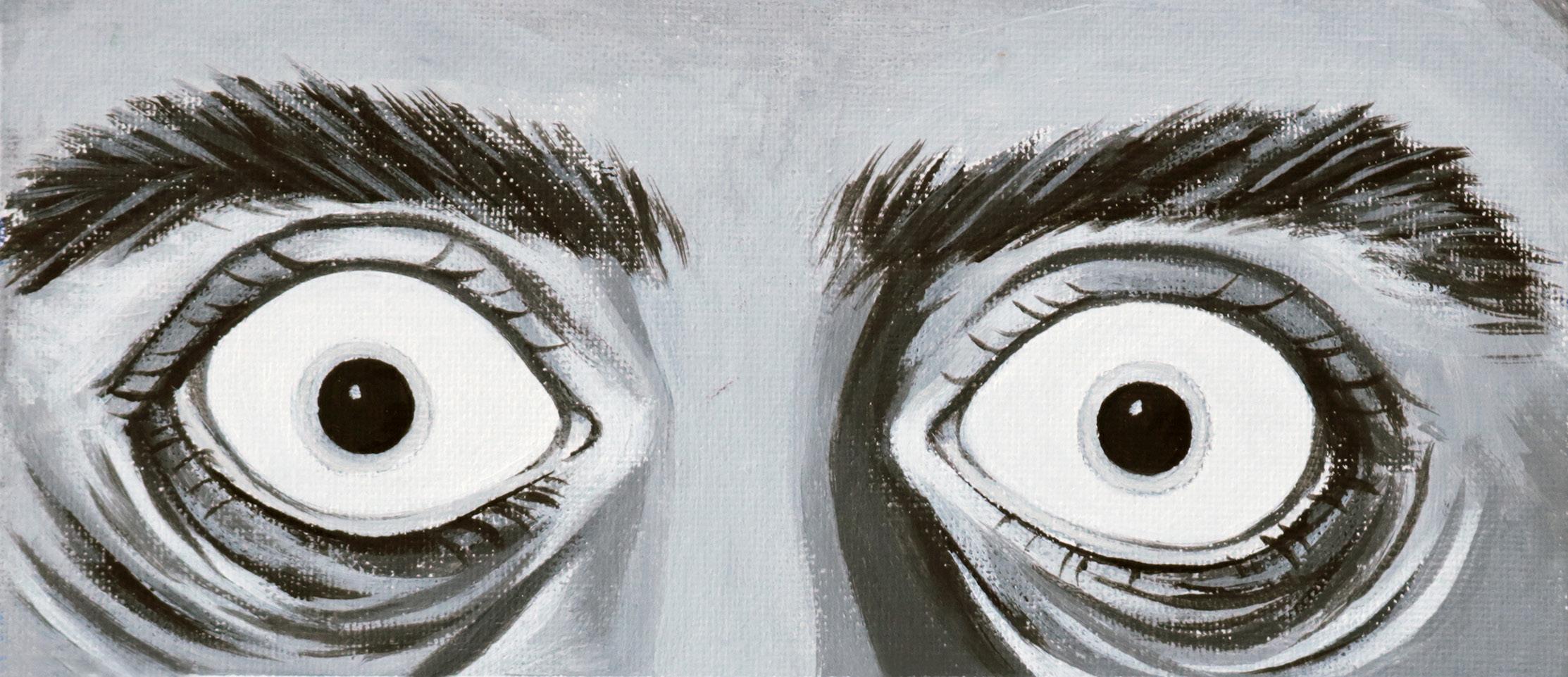
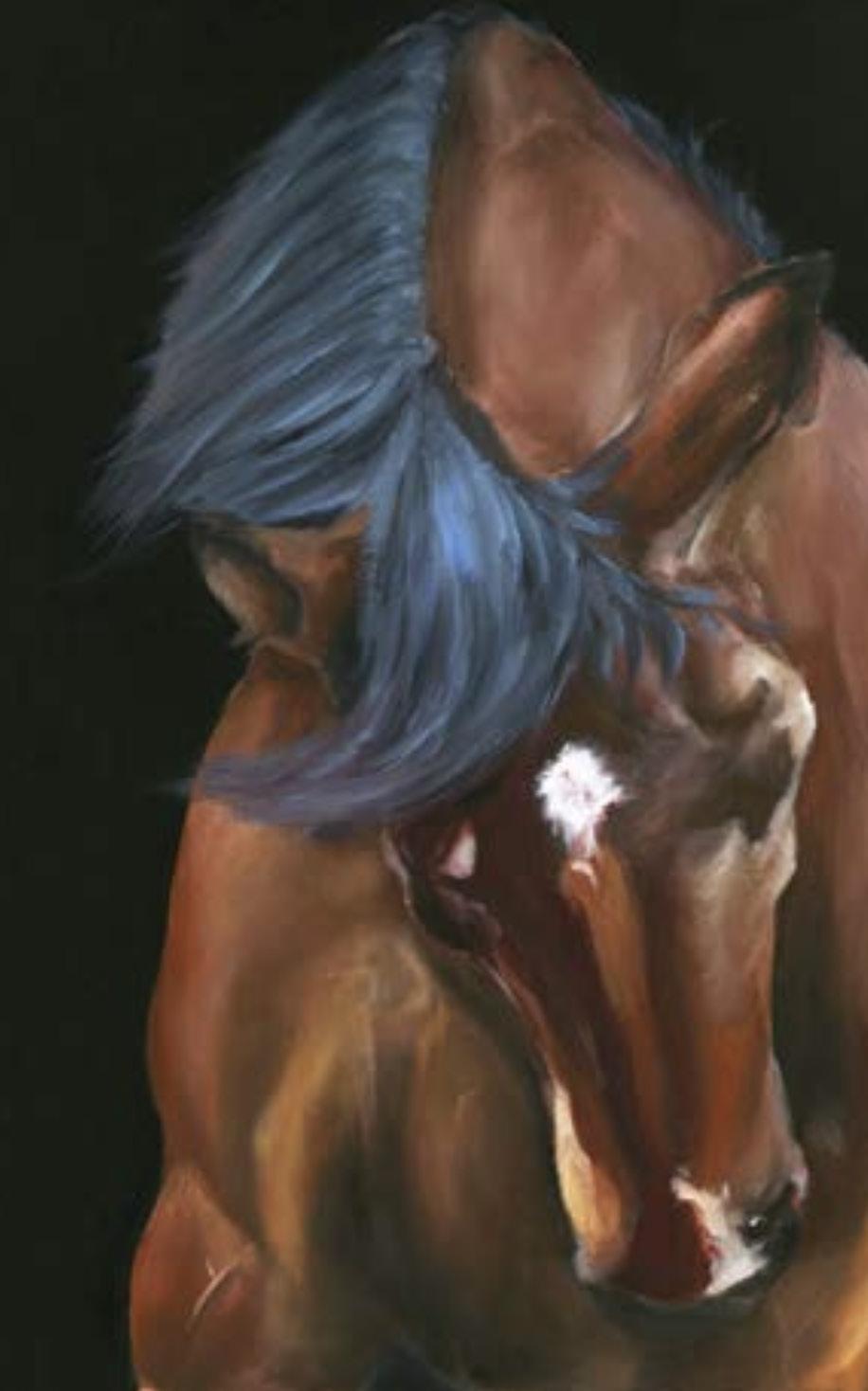
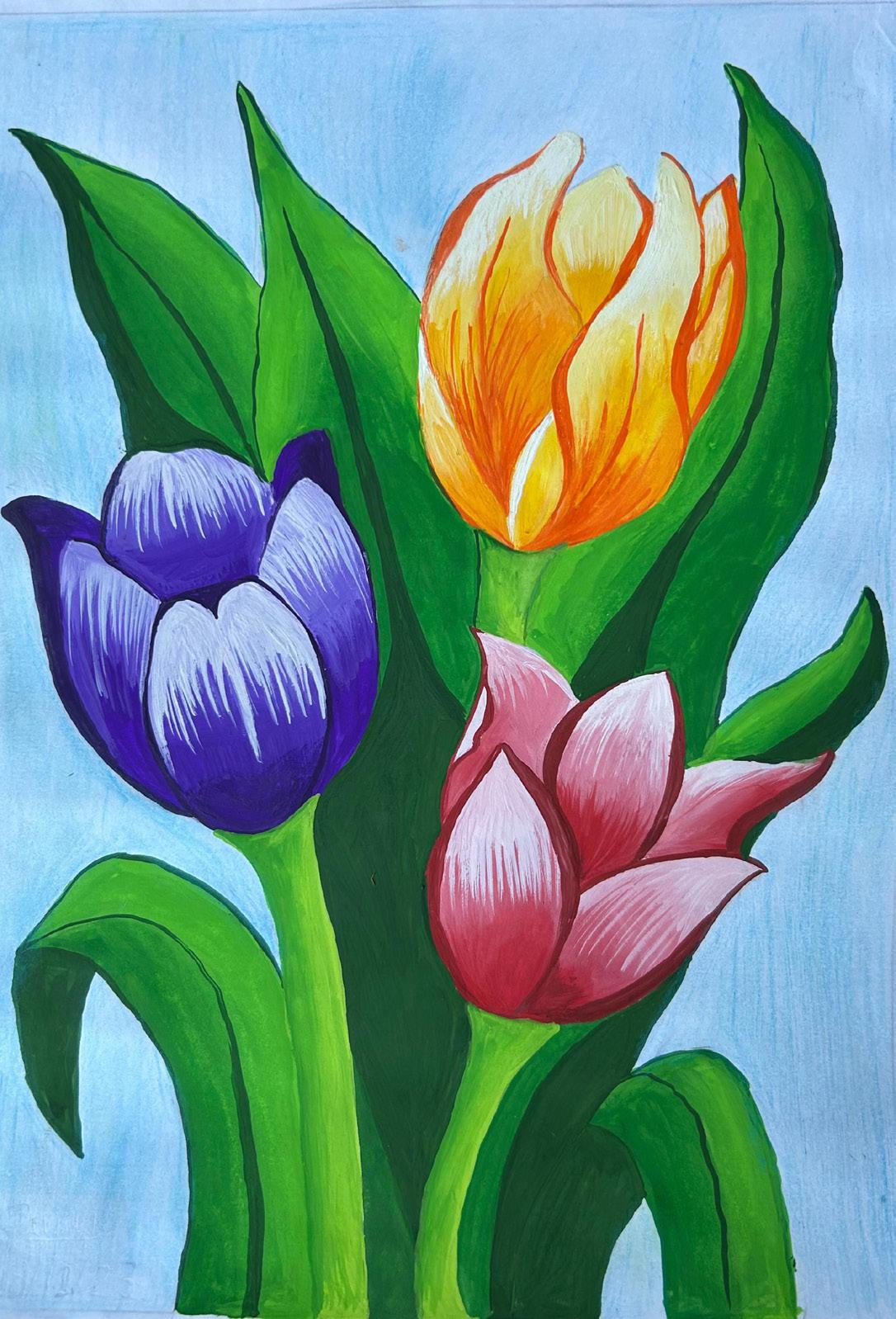
Lee Corbisiero, 5
Anonymous, 7
Finn Chen, 10
Fiction
Maryam Majid, 11
Jupiter Markus, 15
Katherine Leonte, 17
Opinion
Evelyn Tian, 26
Grace Pan, 27
Book Reviews
Emily Biwer, 29
Madeline Olson, 30
Andrew Han, 30
Claire Scheid, 31
Caroline Gordon, 37
Alvaro Araque, 37
Anonymous, 37
Anonymous, 37
Finch Elia, 38
Tasha Yang, 38
Andry Catson, 38
Natalie Nixon, 38
Anonymous, 39
Olivia Feldgus, 39
Grace Tracy, 39
Polina Perin, 39
Connor Frank, 39
Amanda Palermo, 40
Anonymous, 40
Anonymous, 40
Avery Stark, 40
Lauren Juric, 22
Sukriti Mavuri, 23
Gabriella Hoffman, 24
Xiaoyuan Wang, 33
Melissa NG, 34
Arushi Raghavendra, 34
Rintaro Hirota, 35
Rory Tobin, 35
Lala Wu, 35
Jacqui Sykes, 36
Haoning Yin, 36
Shannah Wills, 36
Art Gallery
Ashvy Shah, Front Cover
An Ni Jiang, 5
Iris Cho, 7
Amber Yuo, 11
Anna Ma, 14
Anonymous, 15
Katherine Zhao, 17
Susanna Huang, 20
Ryan Cortenbach, 25
Madilyn Charles, 27
Jenna Gilmartin, 32
Shivika Panghal, 32
Varsha Omkar, 32
Yincheng Qian, 37
Marian de Silva, 38
Jingzhu Julia Cao, 40
Robin Goldfarb, 41
Susanna Huang, 41
Riya Kasture, 41
Keren Ding, Back Cover
Managing Editor: Kylie Andrews
Consulting Senior Editor: Cindy W. Spertner
Consulting Editor: Jada Smith
Sales Account Executive: Sara Shuford

Follow us on Social Media
ARTWORK